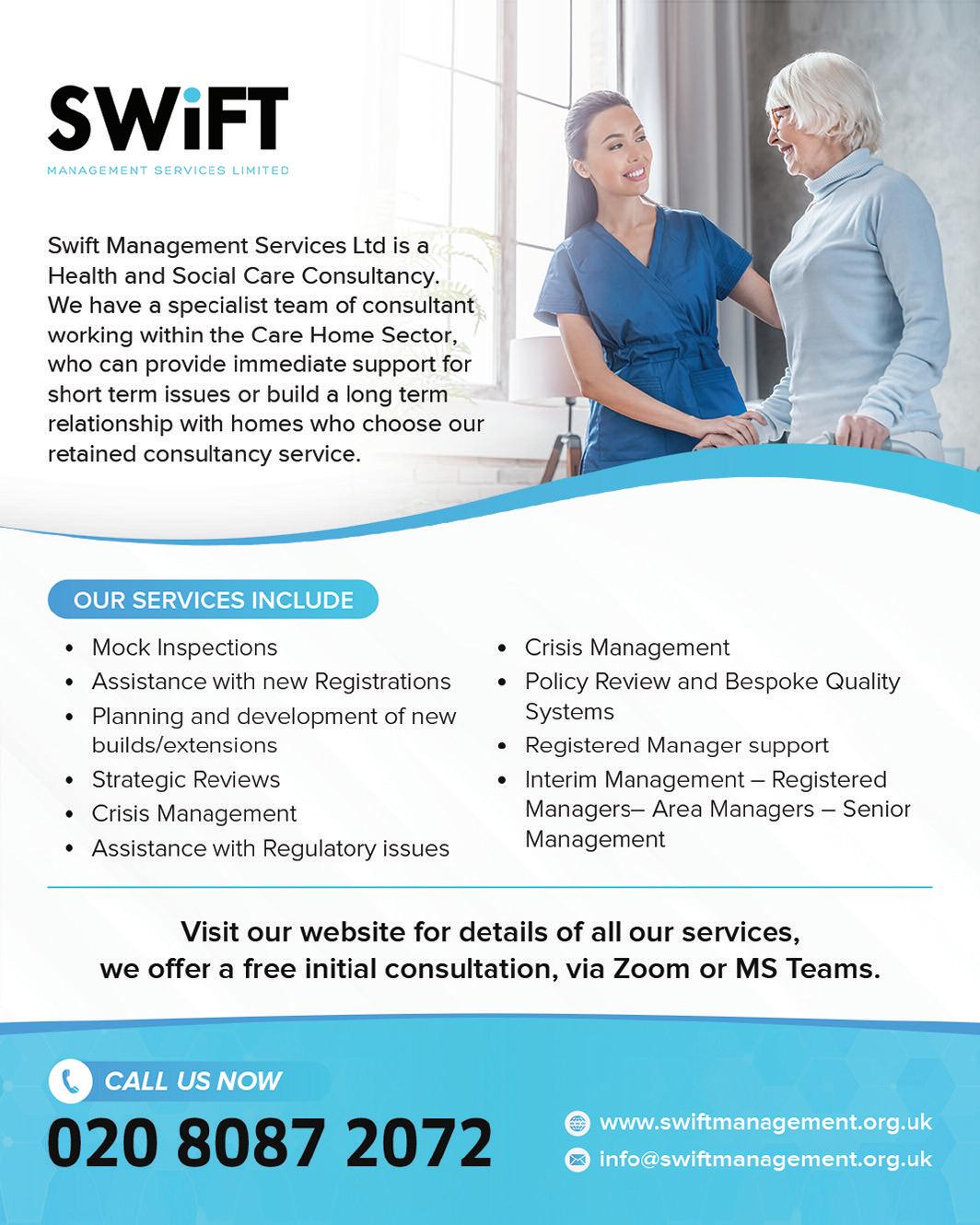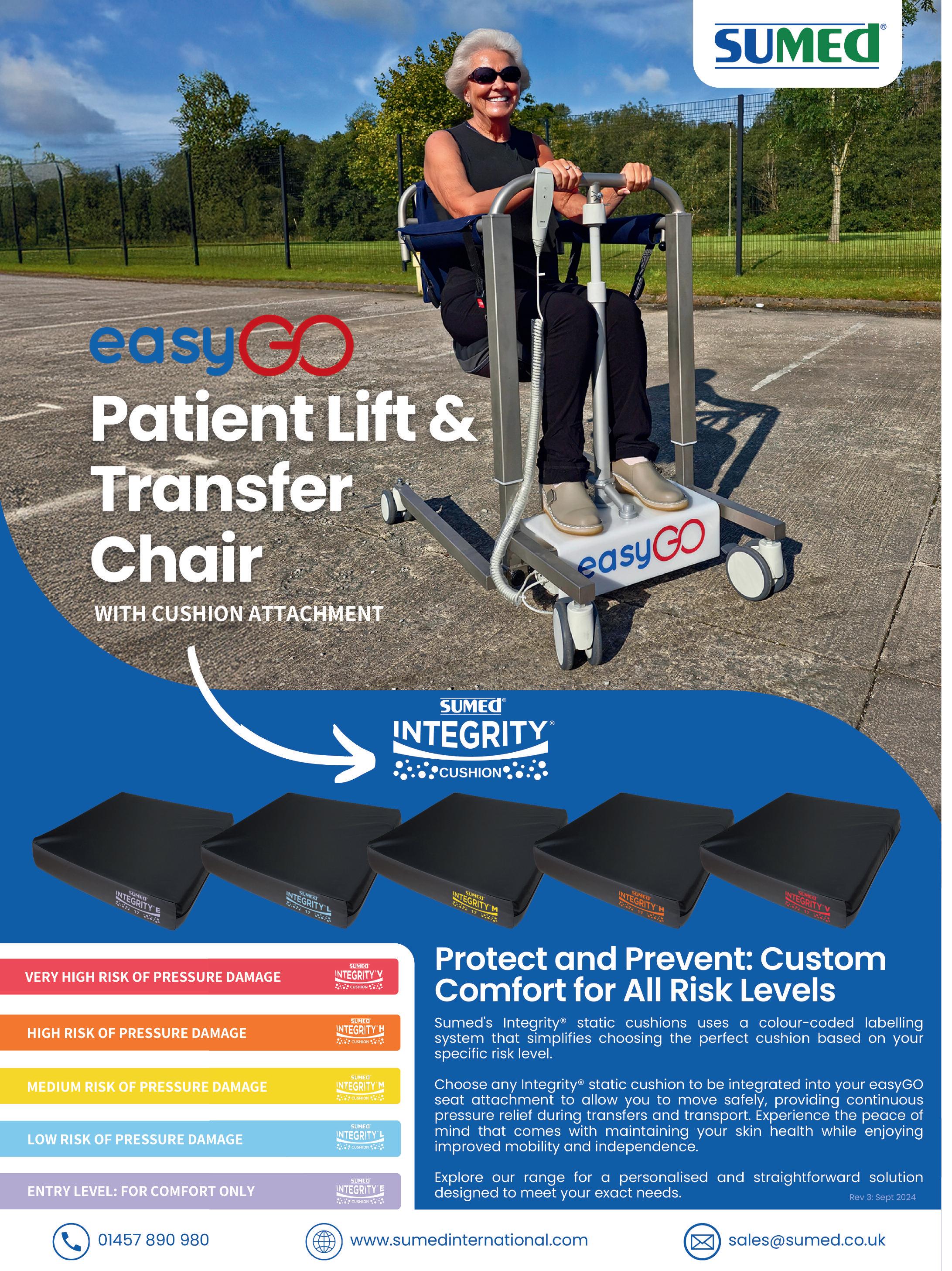















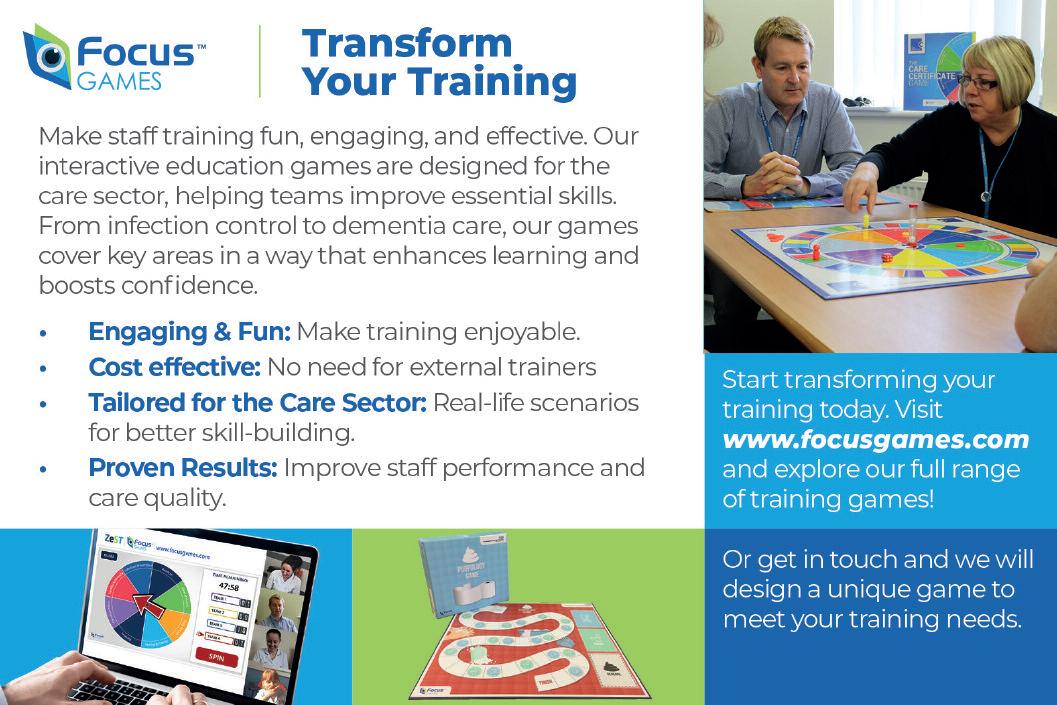


The recent call by the Local Government and Social Care Ombudsman highlights the importance that care providers be required to inform people about its service
The Ombudsman s Annual Review of Adult Social Care Complaints 2023-24 highlights a notable 15% decrease in complaints from privately funded care and at first glance a fall to be commended
With only 333 out of 2 982 total complaints coming from self-funded individuals the figure is, the Ombudsman says, disproportionately low given the size of the independent care sector
This disparity raises concerns about awareness among residents and their families
Introducing mandatory signposting to the Ombudsman's service would be a significant step forward in increasing transparency and ensuring accountability
By doing so care providers can reassure families that there is a clear independent route for complaints to be addressed which is particularly important in a sector where vulnerable individuals can often feel overlooked
It is in the same report encouraging that the Ombudsman upheld 80% of complaints it investigated in 2023-24 reflecting the importance of thorough scrutiny in care provision
Moreover the 99% compliance rate with recommended remedies is a reassuring improvement from previous years where compliance was as low as 64% This demonstrates that when care issues are identified, they are being rectified, a trend that must continue
Mandatory signposting and continued improvement in care assessments will be key to building a more accountable and transparent care system It’s essential for the sector to evolve in line with these recommendations, ensuring that both residents and families can trust the care they receive
A persistent issue the report says remains the delay in care assessments a problem the new Health and Social Care Secretary has pledged to resolve
Addressing these delays will be vital to reducing complaints and improving care standards overall
On a separate note the ongoing challenges faced by the Scottish government in establishing a national care service are a reminder of the complexities involved in such large-scale reform
The withdrawal of support from councils and unions underlines the importance
of having robust sustainable funding and clear implementation strategies
I think most would agree that a national care Service “of some sort” is desirable
The adult social care system is in crisis something we have highlighted often with almost all of the sectors’ leaders and organisations commenting on through our title
Many people who need help are going without vital support State provision is patchy (at best) impersonal and wholly inadequate Unpaid carers are placed under an impossible burden and are unrecognised and unsupported Workers are underpaid, undervalued, and under intense and unsustainable pressure
In the long term a national care service will relieve considerable pressure on the NHS, but we in England must take note of the difficulties Scotland has, as implementing a national care service without a solid financial and operational foundation will lead to similar struggles, and money wasted
We are media partners and exhibitors at next weeks CARE SHOW at Birmingham
NEC we are on stand H05 (near the show's entrance) so please do stop by I will be there and look forward to hearing and sharing your views!
I can always be contacted at editor@thecareruk com and encourage our readers to sign up for our bi-weekly digital newsletter at www thecareruk com and follow us on social media for all the latest news
At THE CARER, we are calling on our readers for help.
As you may have seen in our appeal for support, The CARER has always been delivered in print and online free of charge since 2004 including the sector s only weekly digital issue


We are committed to keeping you informed with the latest news views products and services on the sector s most popular adult social care website www thecareruk com which receives almost 4,000 visits and 26,000 page reads every day
However, with costs rising significantly, we recently put out an appeal for support
We extend our heartfelt thanks to readers who have responded and pledged their support with a £10 donation covering the next two years, and thank you also for your very kind words of support too!
Your contributions are invaluable and if you haven t yet pledged please do consider supporting us so we can continue delivering quality content
For details on how to contribute, please visit www thecareruk com/subscriptions/

(CONTINUED FROM FRONT COVER)
SIGNPOSTING
Local Government and Social Care Ombudsman, Ms Amerdeep Somal said: “People have a right to bring their complaint about adult social care to us as the independent scrutineer “However, they don’t always know they can do so, and independent care providers should be signposting them to us just as councils do Independent care providers will often have both private and council-funded clients, and there should be the same route to redress however people’s care is funded ”
It is likely that low awareness of our role in privately funded and arranged care plays a part in creating this gap between the expectation and reality of the number of complaints we receive Independent care providers are not required by law to signpost users to our service and as it currently stands we know it happens sporadically ”
As a result people are potentially missing out on their right to access our services and providers are missing out on the opportunity to learn from mistakes and to improve their services We want the services provided by the care sector to be excellent across the board we carry out our work to not only give individual redress but to improve services for everyone ”
If all care providers were required by law to signpost to us it would give confidence that people know where to come with complaints and would support any suggestion that the drop in complaint numbers is caused by something other than a lack of awareness
In 2023-24 the Ombudsman upheld 80% of all adult social care (including council delivered care) cases it investigated in detail with 99% of organisations complying with the remedies the Ombudsman recommended to put things right, up from 67% in 2022-23 and 64% in 2021-22, according to its annual review of adult care complaints
ASSESSMENT DELAYS
Key areas of concern over the past year have been delays in the assessment of people’s needs, and a failure to put people at the centre of the care they receive instead fitting that care in with council and providers’ systems
Poor communication with both clients and their families has also been an area of concern throughout the process, with particular issues around the information provided to service-users, and their families, being unclear or overly complex
GREATER TRANSPARENCY
Reflecting on the findings Professor Martin Green OBE Chief Executive of Care England said: “This report brings into sharp focus the interconnected challenges within the adult social care sector affecting both local authorities and care providers It is alarming that such a high proportion of complaints are upheld, but this signals systemic problems that cannot be ignored
“The fact that over 80% of complaints were upheld points to systemic failings that urgently need addressing Local authorities play a pivotal role in the adult social care system and we call on them to work more closely with care providers to ensure that assessments are carried out promptly, and that individuals are
involved in decisions about their care
Equally Care England stands with the Ombudsman in calling for greater transparency and accountability across the sector It is imperative that all care providers signpost their complaints processes clearly enabling service users and their families to raise concerns and contribute to service improvement ” COMPLEX CHALLENGES
Dr Jane Townson OBE Chief Executive Officer of the Homecare Association said 'This report highlights the complex challenges facing both care providers and local authorities The high uphold rates for complaints across the board are concerning Effective assessment care planning and communication are crucial Without these, it is hard to ensure positive outcomes for people needing and receiving care and support
'We're committed to supporting our members to improve communication and person-led care It's clear, though that we need systemic changes Both providers and local authorities must work with people drawing on services to enhance their experience
We echo the Ombudsman s call for all care providers to be legally required to signpost to their complaints process This transparency is vital for building trust and driving improvement across the sector The Homecare Association will support members to up their game in complaint handling and service delivery
SUGGESTED
Complaints are a cost-effective way to identify issues early and make improvements the ombudsman says with organisations viewing them as central to good governance and accountability
Care providers and councils can use the data published by them, alongside their own local information, to ensure their complaints processes are working well, both for people who use their services and the organisation
The ombudsman has suggested questions to check the health of care providers approach to complaints:
• Do you actively seek feedback about your services?
Is your complaints procedure visible in care settings? People should be able to request information about complaints in a format that best suits them
Does your organisation set out a timetable for responding to complaints and keep people informed if there are delays? Long delays and poor communication during the complaints process can cause additional distress for people making complaints
Do contracts between commissioners and providers contain clear processes for handling complaints?
Does your organisation work with local partners to provide a single investigation and response to people with a complaint about multiple bodies?
• Does your organisation’s complaints procedure clearly signpost to the Ombudsman? If people have been through all stages of your complaints procedure and are still unhappy they can ask us to review their complaint
Do you regularly review your organisation s local complaints data and the outcomes of complaints?
• Do your elected members or board members regularly scrutinise complaints data and outcomes? How does your organisation ensure it shares the learning from complaints, across care locations
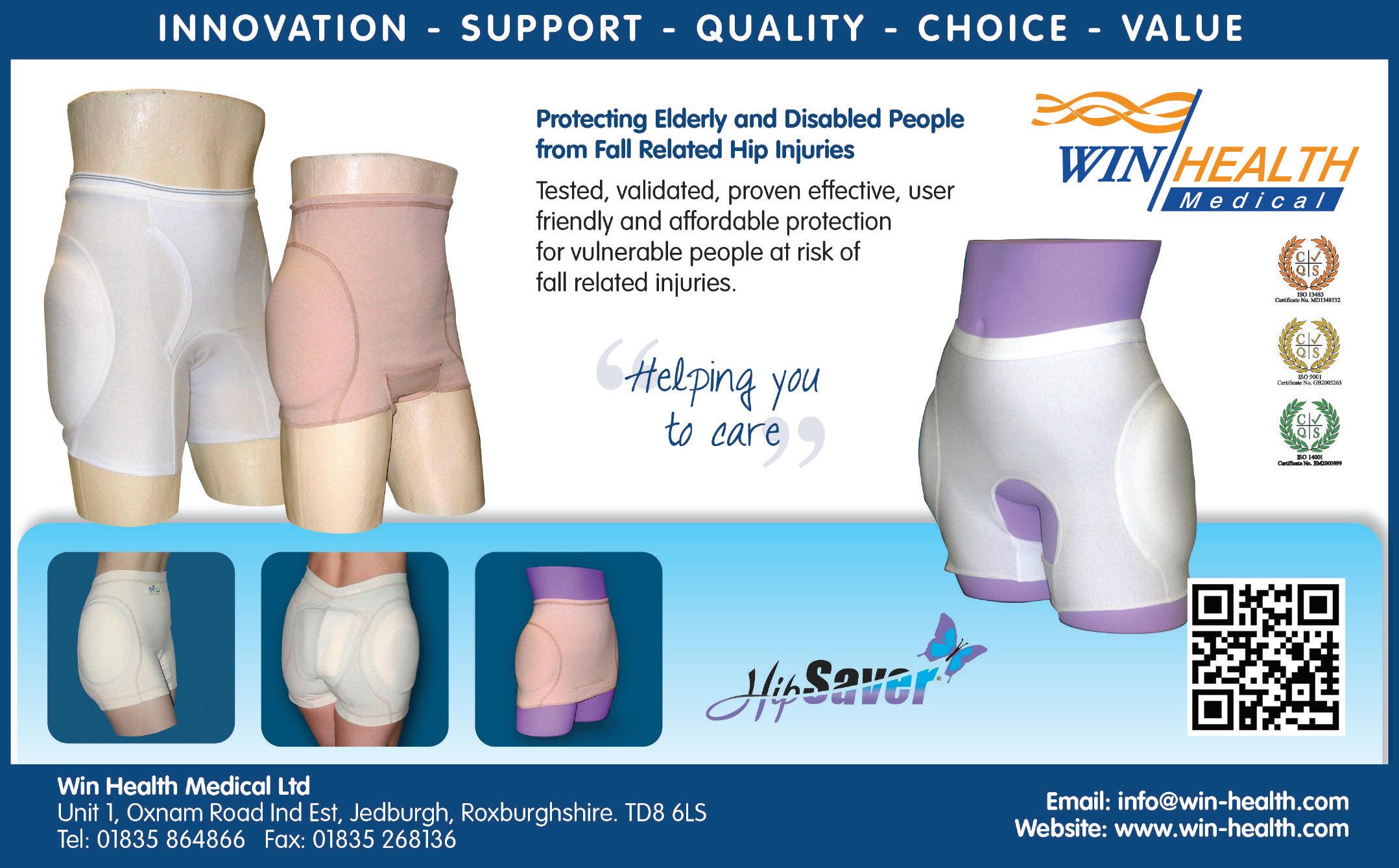

Accounts of care managers experiencing poor mental health due to work-related stress shows there’s plenty for organisations to do in supporting employee wellbeing says Laura Chinyere-Ezeh, HR Consultant at law firm Browne Jacobson (www brownejacobson com)
As rising demand for adult social care and a tight labour supply converge the task of running care homes has inevitably become significantly more challenging
It s deeply upsetting that we continue to hear first-hand stories of registered managers experiencing increased stress levels at work that eventually manifests into poor mental health
A vicious circle ensues as a lack of available workers intensifies pressure on existing carers who become sick from burnout and take time off which further impacts the workforce
DUTY OF CARE
Just as employees have a duty of care towards residents and patients, they can expect similar obligations from their employer
Basic principles include health and safety standards ongoing training protection from abuse and harassment and fair employment practices such as appropriate breaks and working patterns
Even when these obligations are being met, as will be the case in the vast majority of organisations, there are many other considerations that can ensure the wellbeing of staff is prioritised IDENTIFY THE CAUSE
Any care provider that detects poor mental health among sections of its workforce should firstly seek to identify and address any elements of their work that could be contributing to their ill mental health
Emotional stress resulting from the high-pressure nature of caring and work overload are often key triggers, but there will likely be other intertwined issues
Insufficient support from management and colleagues can leave staff feeling isolated undervalued and under-equipped to handle the complex needs of residents due to a lack of experience and confidence
Care provision can involve exposure to aggressive behaviour from service users which can be distressing and their increasingly complex needs could result in carers being anxious about making mistakes
Financial stress poor work-life balance and workplace conflict can also contribute to poor mental health CHECKING IN WITH STAFF AND DELEGATING
The best interventions are often the simplest Regular check-ins between managers and their direct reports could make all the difference in a carer’s general happiness
Taking out 20 minutes for a one-to-one conversation every few weeks helps to demonstrate carers are valued and supported
It also gives managers the opportunity to identify issues before they escalate implement any mitigating steps and discuss with the staff member different approaches to handling challenging situations as part of
their broader personal development
Often it’s registered managers who carry the heaviest load by trying to take on too many jobs alone
Having the confidence in their teams to delegate tasks is crucial to their own mental wellbeing A structure that gives supervising responsibilities to established staff can be beneficial in this respect
Managers should also seek to call upon the experience that exists in their teams whether as part of a ‘buddying’ system that pairs them with new joiners to offer advice and guidance during the induction, or less formally encouraging colleagues to tap into each other s knowledge and share their skills in specialist areas
CARING FOR UNWELL STAFF
Although prevention is better than cure deteriorating mental health can sometimes be unavoidable amid a wide variety of challenges in carer lead environments, perhaps compounded by elements of private lives
It s therefore crucial that employers have appropriate policies and practices in place to prevent bad episodes becoming long-term absence
Managers should explore reasonable adjustments even if they are temporary or subtle which will help with reintegration from any sick leave and make work part of the recovery These may include temporarily reduced working hours or a change in work pattern with more frequent breaks or rota changes to remove them from certain duties
This may carry an extra cost in the short term but will almost always be outweighed by the long-term benefits of a happy and productive workforce that feels valued and understood
Another worthwhile investment is in communicating support from employee assistance programmes, which provide staff with access to professional support such as counselling and financial advice
Employees can also be signposted to the free NHS Every Mind Matters service for practical tips and personalised actions to address anxiety and stress which is separate from the employer
There are many issues that can compound staff shortages and sickness absence is one of them Tactical approaches, such as prioritising staff wellbeing, will help maintain a workforce but care providers must also plan for the future with strategic workforce plans
Skills for Care recently published its Workforce Strategy for Adult Social Care in England to ensure the country has sufficient skills to meet rising demand for care
Its recommendations mirror areas of focus in the NHS Long Term Workforce Plan – attract and retain train, and transform They include long-term planning for employment terms and conditions, investment in training and a legislative basis for a workforce strategy
Care providers must also be proactive by developing their own workforce strategy that ensures they’re equipped for the next five 10 even 20 years
All care providers have to the ability to promote the rewarding nature of providing care to society’s vulnerable members to help attract new people into the sector while adapting workforce practices and processes to develop the behaviours and attitudes that will grow their own future talent pool
Retention strategies should consider the various ways in which they can add value to jobs without incurring extra costs such as exploring the appropriate ways in which flexible working can be accommodated via job sharing and home-working opportunities for administrative tasks, as well as developing real pathways into management and leadership roles
Small blocks can build a big picture in which those who care and give so much feel valued supported and happy – which ultimately contributes to the ongoing delivery of high-quality care and successful organisations



A torrent of bad news on social care today (September 27) sends a bleak weather warning to the Government on the urgent need for reform campaigners say Age UK has reported that the number of people living without the social care they need has jumped to 2m – up from 1 6m last year
And there are reports from up and down the country of care provision being withdrawn due to financial cutbacks
Today the social care provider organisation The Independent Care Group (ICG) warned that the Government could not go on ignoring the crisis ICG Chair Mike Padgham said: Once again we have the bleakest of news on adult social care – a staggering 2m people who cannot get even the basic help they need to live a decent quality of life a quality of life the rest of us take for granted
That is our mothers and fathers brothers and sister aunts and uncles and friends who are being denied the most basic of support – from help getting out of bed, getting washed to making a meal to higher levels of care It is a scandal that shames us as a country
He said the Government had made positive noises about reforming social care but change wasn t coming quickly enough
It clearly isn t their priority Mr Padgham added One of the Government s first decisions was to axe the proposed cap on care costs which didn’t bode well
“And for all the health secretary and the Prime Minister’s rhetoric on improving pay for care workers and reforming social care we are yet to see any meaningful moves
The ICG’s warning comes alongside news of threats to care provision across the country East Sussex County Council is looking at shutting down day services and other cuts because of a lack of funding And in York nine day clubs for older people are to close after the local council withdrew support –again due to funding shortages
Mr Padgham added: As a matter of urgency we must get greater financial support to social care commissioners like local authorities who are currently having to cut back on care because they simply don t have the money to provide or commission it any more ”
Earlier this month a report commissioned by the new Government by Lord Darzi cited problems in social care as a contributing factor to the ongoing crisis in NHS healthcare
Mr Padgham added: This deluge of bad news continues and it comes on top of years and years of reports and warnings that adult social care was on the brink of collapse failing to support the people it is there to support and unable to play its part, alongside NHS healthcare, in the care of our communities
The new Government has promised reform and we continue to give the administration the benefit of the doubt that it will deliver Those of us in the sector have a great deal of knowledge on what needs to be
done and are willing and able to offer that support to the Government and to work with them on solutions to the crisis
“As today’s figures from Age UK show, we cannot wait much longer People are going without care and no Government should sit by and watch that happen without taking urgent action to tackle it
The ICG welcomed today s State of Health and Care of Older People report from Age UK It concludes that the country is failing to cope with the needs of an increasing number of older people It is good that the older population is growing and that is something that should be celebrated Mr Padgham added “We need to create a society where we can embrace that and where people can live long and fulfilling lives with the support that they need when they need it
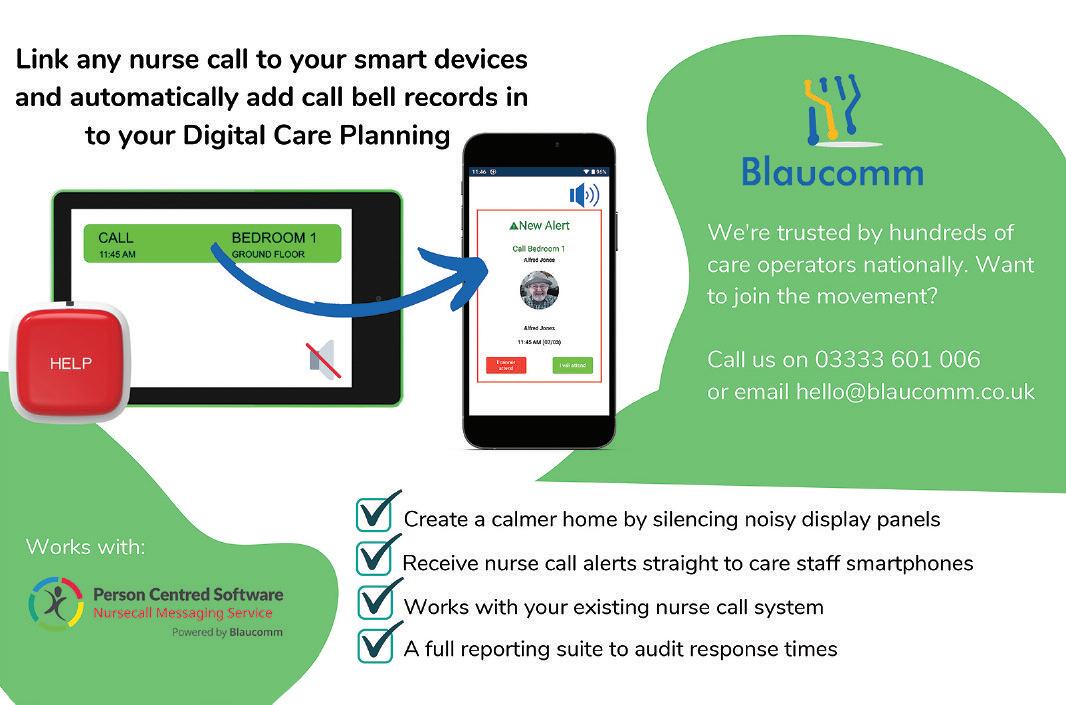


Care homes are home to vulnerable people with complex and varied needs Therefore it is vital that a high standard of professional conduct is upheld by all those working within them
Whilst most care home employees carry out their role with a great degree of integrity and care in cases where employees’ actions and behaviours fail to meet these standards intervention is required to ensure the protection of residents This can come in the form of disciplinary procedures up to and including dismissal
Within any organisation, managing employee misconduct is a core HR function and therefore often there will already be a formal process in place However there is always the chance that the employer will misstep and get it wrong which can lead to significant consequences from reputational damage and tribunal awards to damaged employee relations Therefore, there is a lot riding on the quality of a misconduct investigation
So, how should care homes ensure they’re conducting a fair investigation?
WHY CONDUCT AN INVESTIGATION?
Investigations play an important role in the disciplinary procedure To fairly dismiss an employee employers must meet a strict set of criteria as set out by the Employment Appeal Tribunal (EAT):
• They must genuinely believe that the employee committed the alleged offence The belief must be based on reasonable grounds after an appropriate investigation
The investigation must be reasonable in all the circumstances
Conducting a thorough and fair investigation is crucial to meeting this requirement for dismissals to be reasonable under s 98 of the Employment Rights Act 1996 WHEN CAN I INVESTIGATE?
Employers cannot begin a misconduct investigation without first establishing a reasonable need to investigate It must be believed that an employee has acted in a way that is considered a breach of the care home policies and procedures This need can be established in several different ways including a report from a witness a complaint from a victim or the realisation that something is amiss in the workplace
The need for an investigation in all disciplinary matters is critical It’s fundamental to natural justice, fair-

By Kate Palmer, employment services director at Peninsula
ness and a requirement under the Acas Code of Practice on Disciplinary and Grievance If an investigation takes place without an initial need to investigate being established, an employer could ultimately be unable to defend an unfair dismissal claim and face a potential uplift of up to 25% of any award for their failure to follow the Acas Code
In some cases an investigation may be as simple as having a discussion with the employee If during this discussion you find that there is no case to answer or that their action was minor or trivial then it can be dealt with informally Discussing the problem and agreeing how to prevent the situation from recurring again is generally enough to resolve such issues However, not all cases are so straightforward In cases of more serious misconduct it’s important to carry out a full and thorough investigation HOW MUCH INVESTIGATION IS NEEDED?
As previously mentioned, a thorough investigation is an essential step on the path to dismiss an employee But there is no one-size-fits all approach to conducting an investigation Several factors can impact the course an investigation will take including the severity of the alleged misconduct or whether the employee takes responsibility for their actions
When inviting an employee to a formal disciplinary hearing you must clearly set out the alleged misconduct including specifics such as date time behaviour that is being investigated and any other parties who are involved and/or witnessed the behaviour The evidence that the employer will be relying on should also be provided to the employee, in good time for them to have read and understood it and to enable them to explain their position
It can be tempting to skip certain stages of a disciplinary procedure if the employee admits the behaviour however without a thorough investigation it cannot be determined if there are any mitigating circumstances For example if the employee was aware that what they were doing was against the expected behaviours within your organisation if they have received appropriate training and support if they are covering for another employee or if they are telling the truth Skipping straight to disciplinary action without thoroughly investigating could result in an unreliable outcome This could put the employer at risk of a claim or of the misconduct reoccurring where the true culprit remains unknown Employers need to show that they have acted reasonably in bypassing an investigation in these circumstances
Whilst it important that misconduct is dealt with quickly particularly in the care home environment where employees are responsible for the wellbeing of vulnerable people it is critical that a fair and through investigation takes place to ensure that the outcome is accurate and that care homes are protected in the event of an Employment Tribunal Even for more minor issues, completing some form of investigation can help employers get to the bottom of the issue and find out how they can prevent repeated occurrences in the future thereby creating a safe environment for both residents and employees
For more advice on conducting workplace investigations read our handy free guide here


or
and


New analysis carried out by Age UK has found that 2 million older people in England are now living with some unmet need for social care
This stark finding is one of many in a major new Age UK report published today The State of Health & Care of older people 2024 Drawing on the latest available data the report concludes that England’s health and care services continue to be under enormous pressure so that despite the best efforts of many dedicated staff, they are currently unable to meet the needs of all the older people presenting who require treatment, care and support
Long-standing problems were greatly exacerbated during the pandemic years and despite some recovery since then in some areas in others it has not yet proved possible to arrest a decline in capacity service availability and performance with extremely worrying implications for older people and their families and unpaid carers This is all the more concerning in light of a rising older population the growth of which will accelerate still further over the next decade, increasing by a projected 4 3 million by 2044

However more optimistically the new report shows that significant numbers of emergency hospital admissions could definitely be avoided if the right kind of help was provided earlier on, before relatively minor health problems develop into full scale crises The inability of services to intervene quickly or effectively enough to support older people at home leads to many waiting for very long periods in A&E and then becoming stuck in a hospital bed because of a lack of community-based care creating huge problems for hospital managers and undermining their own chances of making a good recovery
Age UK finds that in particular, very old people aged over 80 are often not getting the good and timely NHS treatment care and support they need and ought to be able to expect More than one in four (28%) are living with some unmet need for social care, and people in this age group are also the most likely to experience long waits in A&E having arrived there by ambulance Many have complex health and care needs and at the moment the system is often insufficiently geared up to meeting them though there are some isolated excellent examples of good practice The Charity says they urgently need to be scaled up and that the forthcoming NHS Ten Year Plan is well-placed to be the vehicle for driving this through THE DATA SHOWS THAT OF OLDER PEOPLE AGED 65:
10% (1 1 million) of older people have difficult dressing
5% (500 000) of older people have difficulty walking across a room
6% (640 000) of older people have difficulty bathing
• 1% (140 000) of older people have difficulty eating
6% (600 000) of older people have difficulty getting in and out of bed
• 4% (440 000) of older people have difficulty going to the toilet
OTHER KEY FINDINGS INCLUDE:
• The number of people over 75 has grown by 18% since 2017 Yet fewer older people are receiving local authority long term care (542 420 2022/23 compared to 565 240 in 2017/18)

Growth in the number of GPs is not keeping pace with the population growth of older people aged 75+
The risk of needing to attend A&E increases as we get older: per 100 000 population, there are 49,917 attendances for the 75-79 age group, rising to 93 931 for those aged over 90
The social care sector is struggling to fill vacancies in almost every key adult social care role
The numbers of district nurses reduced by 17 5% between 2014 and 2023 – a trend in completely the wrong direction given how central their role is in treating older people at home for problems like pressure sores which can develop into serious health problems requiring acute care Similarly the NHS workforce is not growing fast enough to meet increasing needs and acuity but to the extent that it has been growing at all hospitals rather than community settings have generally been the beneficiaries
The report finds that primary (GP) and community health services and social care are either simply inadequate in terms of availability or are insufficiently joined up and planned
The charity says services must work better together in ways that enable older people in declining health to be identified and assessed and the provision then has to be in place so they can benefit from early intervention and proactive support Moving to a position where all these things happen, not just in some places, but everywhere is the big challenge we face and is likely to require a shift of resources out of hospitals and into the community
Caroline Abrahams Charity Director at Age UK said “It’s deeply worrying that the numbers of older people living with some unmet need for social care have now reached two million out of a total older population in England of about 11 million Some of these older people may be just about managing but others will undoubtedly be struggling badly with everyday tasks like getting out of bed and washing increasing their risk of problems like falls which could cause them serious injury, or worse ”
The Government has not yet said what it intends to do in terms of reforming and refinancing social care though it has made it clear that it sees social care playing a crucial role in the more joined up communitybased Health and Care approach it wants to see supporting older people to stay fit and well at home We completely agree with Ministers and with Lord Darzi that this is the right direction of travel but the question we would ask is whether it will prove possible to achieve this without the comprehensive social care reform which Ministers suggest it will be impossible to achieve during this Parliament
“Our fear is that unless this Government grasps the nettle of social care reform firmly and quickly, they will find it impossible to stabilise and strengthen the NHS either to the enormous detriment of all of us but of older people its principal client group, most of all ”
Some of the findings in our new report are frightening in that they show how badly our Health and Care system is currently failing some older people the oldest old especially despite the professionalism and commitment of many kind and dedicated staff These older people do not have time on their side and it is above all for their sake that we would urge the Government to work with the NHS local government and charities like Age UK too, to chart a path to a better future for Health and equally for Social Care ”



from those around them
Care home managers at Elmfield Care (www elmfieldcare co uk) a leading care home provider with homes in Salisbury Chippenham and Lydney offer their advice on how to boost resident confidence
FOCUS ON INDEPENDENCE
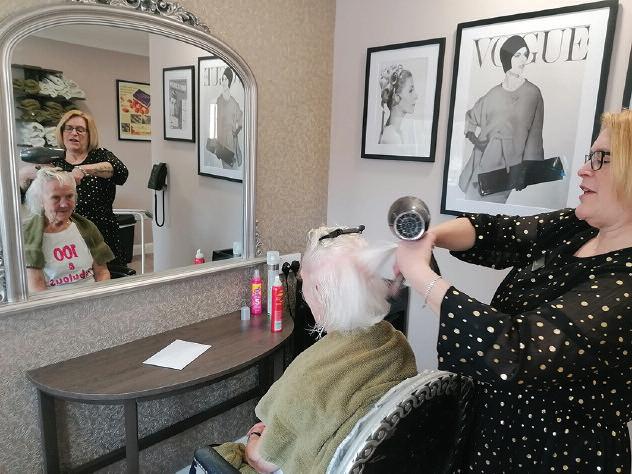
Empower your residents to make their own choices and complete tasks themselves” Rachel Gittins, Flowers Manor Care Home
Lifestyle Manager shares We try to encourage our residents to take the lead as much as they can this autonomy helps our residents feel more in control over their lives and confident in their decisions and themselves ”
“It s important to note that we have residents of all abilities and independence is a spectrum Care home staff need to find the balance between offering support and encouraging residents to be independent Every approach we have for care home residents is personalised to each resident, which plays a vital role in helping them be more confident in their abilities
FACILITATING HOBBIES
We find all our residents have different interests and hobbies so we try to personalise these as much as possible for our residents Bartosz Turewicz Nodens Manor Care Home Manager shares
Hobbies can provide residents with structure to their days and can help them focus on something they enjoy which provides residents with a feeling of control and direction
At Elmfield Care each home has an activity calendar which is shared each month with our residents and their families, so residents know what s coming up and can decide on what activities they want to join
Homes need to have an individual approach when it comes to hobbies to make sure each residents interests are catered for and are for all abilities ”
SOCIALISATION AND COMMUNITY
Emily Luckhurst Old Sarum Manor Care Home Manager shares: Socialising is important for our mental and emotional well-being To help our residents feel more confident we encourage them to take part in our organised events that are chosen based on the range of interests and abilities our residents have This encourages them to make friendships and connect with the other residents too
“We also arrange regular trips out in our local area so our residents are regularly getting out as staying in can feel isolating for some residents ”
Bartosz Turewicz adds “Encouraging care home residents to exercise has many benefits Including making them feel more confident in themselves ”
At Elmfield we have a range of exercises across all abilities
Exercise helps strengthen muscles improves balance and increases stamina Which helps our residents complete everyday tasks easier and allows them to maintain more independence It also gives our residents a sense of accomplishment that helps boost their confidence
BEAUTY TREATMENTS
Emily continues Just like anyone else our residents love the feeling of being pampered and cared for which is why supplying beauty treatments is so important
We also find, appearance can play a huge part of how we see ourselves so having beauty treatments such as hair styling and manicures can help our residents feel more like themselves which helps boost their confidence
Likewise it also gives our residents the chance to chat with the stylist and other residents which can help their mood and reduce feelings of isolation Overall beauty treatments go further than just the physical appearance of our residents but also help their mental and emotional well being
It will come as a surprise to no one that care is approached differently, in different parts of the world









Cultural differences make an enormous difference In France there are dementia villages without boundaries to the surrounding town but through design the residents stay put and people from town come in to enjoy shared experiences with them

In Japan, where there are simply not enough younger people to look after the elderly they have devised clever design strategies which allow them to operate with lower staff ratios than we generally employ in the West The concept of an information hub related specifically to care retirement and dementia interiors led to the development of the ThirdAge Design podcast and website with listeners in 63 countries Why was this necessary?
UNLOCKING RESEARCH
The breadth of this topic is enormous, and operators, designers and architects are generally time-poor
The Universities of Sterling, Newcastle and Hertfordshire are wellrespected in conducting research but
a wider breadth of information available from other countries which we might adapt to suit UK needs
Generally this must be accessed via individual academic portals to which you must subscribe which can be both time consuming and expensive Simply put the research tends not go to the people who can implement the work
INTERNATIONAL INSIGHTS
Supported by Wissner-Bosserhoff The Third Age Design (TAD) provides an interactive international community hub for care retirement and dementia design with transcripts translated into 12 languages in addition to English The hub subscription is free by signing-up at www thirdage design where the podcast can also be accessed in addition to all usual podcast platforms Topics include: the impact of AI on care settings, elegant bariatric design, and ‘Design Rules and How to

Speaking on the Voices of Care Podcast from Newcross Healthcare Salma Yasmeen, chief executive of Sheffield Health and Social Care FT (SHSC) discussed how better integrated health services can be the catalyst for national economic growth This echoes the call from Lord Darzi that the NHS should “contribute to the nation’s prosperity ” Salma was co-commissioner of the Pathways to work report (Chaired by Sir Alan Milburn) which looked at how national and local systems can unlock the potential of millions of people who would like to work if they had the right support and employment opportunities Over the next 12 months Salma stated that one of her regions key priorities is to look at ‘what can we do through collaboration with our partners to support people to develop pathways into employment?’ Salma stated As part of the research into the Pathways to Works report we heard from a range of stakeholders across South Yorkshire And most of them want to work but 75% of those people we surveyed were out of work because of ill health Ill health and people being economically inactive are inextricably linked and we can t ignore that The podcast’s host, Suhail Mirza, and non-executive director of Newcross Healthcare asked The Pathways to Work report claimed that in Barnsley alone a £10 million investment programme pilot programme would result in £70 million of economic benefit if rolled out nationally £23 billion Has policy to date been directed at the wrong target?”
Salma comments We have not invested in occupational health services or wellbeing services and support the way that we should What people need is tailored bespoke support and for employers to
take a preventative lens to staff that are ill and when people are unwell how do you provide them with good occupational health services?
We need to create pathways into employment that are targeted that make sure that we take a whole systems approach Organisations like us in the health and care sector big employers and private employers need to work together with local authorities and Integrated Care Systems for local populations We must develop a much more inclusive approach to our economy and ensure we’re able to address our workforce shortages And I think that is at the heart of what integrated care systems have been set up to do ”
Suahil Mirza notes: One of the key findings of the report does allude to the role ICBs and the healthcare system generally to partner with employers Are you beginning to see that and is there an actual willingness to do that?”
Replying Salma says: I think all of us want to make a difference to the populations within which we reside I think there is real commitment We are looking for ways to work together to address this issue and have a collective impact We are taking the recommendations of the report forward in Sheffield and working together with our partners a freedom to innovate locally with partners and make a real difference for our citizens There is a willingness to collaborate one which puts people at the centre and to try a different approach to one that’s been flogged for the last ten years and not had the outcomes that we would have hoped for
Salma also discussed the core services of SHSC (which serves a population of some 600 000 in the Sheffield area) supporting people with mental health and learning disabilities She highlighted a key strategic shift: we ve spent a significant amount of time recently investing time with our primary care partners to develop an enhanced integrated mental health offer in primary care so that we can stop people needing to come into secondary care”
This shift from acute setting would no doubt receive support from Wes Streeting aligning as it does with one of his three key shifts for the NHS But there is much more to do and Salma is candid about the mental health challenge facing the nation:
“I think the future of mental health care is about continuing


Prevent ever yday wear and tear with Yeoman Shield’s extensive range of easy-clean, wall and door protection
Our attractive, maintenance free, hygienic products protect healthcare environments from costly impact damage, making repainting and repair a thing of the past
Blending with decors, and available in primar y dementia-friendly colours, our designs can include signage, to promote the well-being of patients and aid wayfinding
But we don’t stop at walls Our Fire Door Ser vices are specially designed to offer an extra layer of safety in care settings From regular inspections and repairs to complete replacements, Yeoman Shield’s fire door ser vices help you meet all relevant safety regulations, giving you peace of mind
By Carlos Esquivel of Technology Consultancy

Technology is an integral part of all our lives and a key differentiator for businesses In a few years we have gone from carrying paper maps and hoping to get to the right place to having precise GPS location in our hands Tasks that would have required days of work now just involve a few minutes of searching and new AI tools are making this even simpler Those businesses that use it effectively whatever sector they’re in deliver a better service and are more profitable In the care industry technology can also be used to improve the lives of the vulnerable people in care However it is also easy to get it wrong and waste money on systems that make little to no contribution What is available and how can it help you and the people in your care?
Technology can help both the residents being cared for and the people supporting them Starting with the latter; as you re not doubt only too aware, in structured care and support environments there are numerous regulations and processes that need to be followed This creates a heavy burden of work that detracts from the primary mission of care Digital solutions, ranging from more efficient software all the way to IoT (Internet of Things) integrations can relieve that burden To give just a few examples of this in practice:
• Carers can automatically be registered as on-duty when entering the premises through their mobile phones or smartwatches tracking their shifts of work seamlessly
• If an incident happens, carers can dictate anything that needs recording and provide evidence A smart system powered by AI can go through the notes and assemble them in the right format for a report that s in compliance with CQC regulations
IoT devices can help monitor people alerting staff if their vital signs are not right or if they fall and require assistance This automated monitoring can help increase privacy for the people under care while still allowing the carers to react quickly if they re needed
Technology can also help directly There are numerous studies of VR (virtual reality) environments being used to support people with autism by enabling them to practice unfamiliar scenarios (to build their confidence) The VR improves the user s communication skills while reducing setbacks caused by misunderstandings in social interactions These environments can of course also be used for other psychological conditions They are typically self-paced allowing each person to explore as they feel comfortable
You have probably heard the media talk about the metaverse One key application is to reduce the feeling of isolation by providing an alternative space for social interaction For people in care homes that means being able to talk to family and friends in other locations, and even connecting different care homes in virtual environments This can provide a valued social experience well beyond the perceived two dimensions of a video call The Metaverse can also be used to provide virtual tours and expeditions for those who struggle with mobility And unlike the technology provided through apps on phones the digital environment in the metaverse is accessible without needing any technical understanding or skills
Our new AI tools are capable of processing vast amounts of information which can be used to provide personalised care plans that take into account specific medical histories preferences and past activity to improve their effectiveness Smart software assistants can surface the right information to the carers, at the right time so they can take better decisions without having to slog through pages and pages of information
Connected environments can also help recognise early signs of a potential incident so that carer staff can intervene before it happens
The above is just scratching the surface of what can be done and all of these things are possible now Technology can be added incrementally so that it is available within budget and still provide tangible benefits that make the lives of the people under care and their carers easier This is a brave new world where technology can make us more human than ever
Allison Porter, Wellbeing Coordinator at HC-One s Rose Court care home in Radcliffe Manchester has won Best Activity Provider/Lifestyle Lead at the Dementia Care Awards held in Sheffield on September 26 2024
The awards ceremony took place at Cutler’s Hall in Sheffield on Thursday, September 26 2024 The National Dementia Care Awards are an annual award ceremony celebrating the outstanding practice commitment and excellence of those who work within the dementia care community to deliver person-centred care for those living with dementia across ten different award categories Rose Court’s Wellbeing Coordinator Allison Porter and Home Manager Leanne Batten-Smith, travelled to Sheffield, where the awards ceremony was held and was presented with the award by Hilary Woodhead Executive Director of the National Activity Providers Association (NAPA) Allison supports in planning a variety of activities at the home and also plans weekly trips for residents out in the community
Due to her commitment and passion NAPA invited Allison to join their regular meetings to support care provisions NAPA have also encouraged Allison to share her initiatives as she has been recognised as a role model by external professionals too
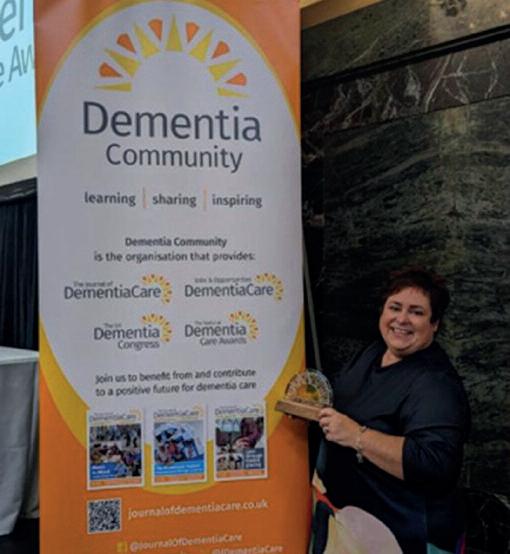
The National Dementia Care Awards chose Allison as the winner, and they stated: “The winner was selected because of her beautiful person-centred support She has an inclusive and imaginative approach providing multicultural activities tailored to meet the individual needs of residents
“She is a leader, innovator, and advocate, her voice within the care home is heard and respected She encourages community involvement inter-generational initiatives and positive engagement with families
“The judges particularly commended her creative endeavours to reduce the use of anti-psychotic medications by introducing therapeutic interventions and sensory experiences
Leanne Batten-Smith Home Manager at Rose Court commented: I am extremely proud of Allison winning this award and glad her ongoing inspirational work, dedication and commitment has been recognised by this achievement We a truly very lucky to have her as part of the team at Rose Court
Allison Porter Wellbeing Coordinator at Rose Court commented: I would like to say a massive thank you to Leanne and my Rose Court family Also, my wonderful husband Mike who supports me very much ”
courses this year This unique addition provides excellent value and a fully robust training package SCTV are delighted to have won several awards over the last 12 months including Best Online Health and Social Care Learning Platform – Global Health & Pharma Social Care Awards 2024 • ‘CPD Provider of the Year’ – The CPD

believe that high quality training should be accessible to all and offer regular, free courses which include a digital certificate accessible via their website
The company stands behind a clear mission and set of values which define their ethos and their dedication to both the Care Sector and those within it These can be viewed at: Mission Statement and Core Values - Social Care TV (www social-care tv/about/mission-statement-and-core-values) Social Care TV are a responsible business committed to ensuring that their actions have a positive impact on their employees, customers, the wider health and social care community and the environment Above all SCTV
cared for
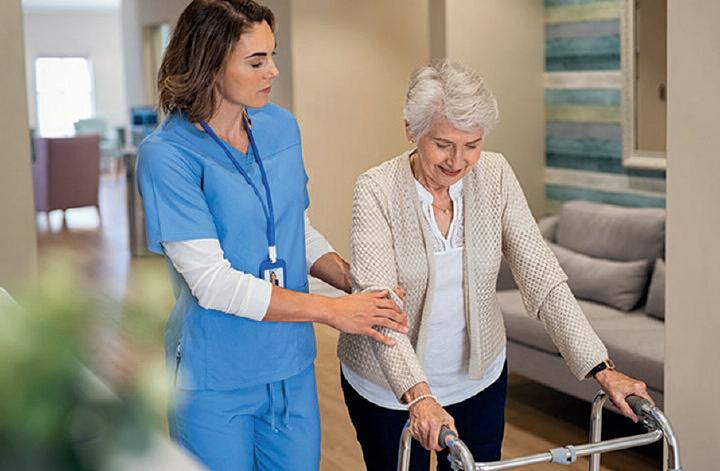
“These
“It’s a
“The














By Daphne Doody- Green, UK Market Director, CIPD

work over the past year with most choosing not to report incidents such as verbal abuse and harassment according to the 2024 CIPD Good Work Index North of England report
The research – from the annual survey of close to 900 workers across Yorkshire and Humber the North East and North West - also reveals that victims of workplace conflict suffer more from poor mental health and a lack of trust and confidence in management
As a trusted advisor to the government, the CIPD - the professional body for HR and people development - is calling for employers to ensure line managers are trained and prepared to deal with conflict effectively This starts with addressing the underlying causes, such as poor management practices and excessive workloads WHAT CONSTITUTES AS BULLYING, DISCRIMINATION, AND HARASSMENT?
The world of work is changing at pace and line managers are facing many new people challenges For some employees homeworking and the rise of technology threatens to create an always-on culture where issues can be spread far and wide, across online chat platforms
Therefore it s never been more important for line managers to play a vital role in identifying challenging and dealing with conflict at work, including unfair treatment and sexual harassment
To achieve this they need to participate in regular people management training This should offer specifics around what bullying discrimination and harassment looks like and how to resolve conflict by being able to have difficult yet open and honest conversations to prevent and tackle conflict at work
Managers must also take the time to understand their organisation s policies and procedures on bullying discrimination, and harassment and how to report issues in a timely manner, so they are investigated swiftly IS A MANAGER’S ‘STYLE’ CAUSING CONFLICT AND STRESS?
Managers are at the heart of people’s experience of their workplace What they do and say has a significant impact on their team s motivation engagement and overall performance This explains why manage-
ment style’ can often be the source of conflict and is the second most common cause of stress at work after unmanageable workload
People managers must reflect on their own management style and the impact their behaviour has on others They should become part of the solution to resolving workplace conflict at an early informal stage before incidents escalate
To do this people managers must be open collaborative and compassionate to create a culture where staff feel trusted and confident to speak up without fear of judgement or being ignored
AVOIDING EXCESSIVE WORKLOADS & AN ‘ALWAYS ON CULTURE’
Rising technology and remote working is giving many employees – particularly parents and carers – a better work-life balance However the blurred lines between work and home have led to many staff working longer hours to manage increasing workloads – often out of hours - and working when they are ill
Line managers need to take effective steps to manage the main risks of excessive workloads which can cause stress and mental ill health among their workers
As part of this they must assess individual and team workloads to make sure they are reasonable set clear expectations about taking breaks and act as role models for healthy working practices This includes taking time off themselves when sick Providing staff with autonomy to control how, where and when they work is also key to empower rather than restrict them in their roles
AND
Staff attitude surveys will enable people managers and the wider organisation to collect feedback in areas like gender equality and bullying and harassment
Monitoring the gender diversity of the workforce at every level including for recruitment and promotion will also help to highlight if there is any potential discrimination or harassment on grounds of gender
NEW LAW TO PROTECT WORKERS FROM SEXUAL HARASSMENT
From October 2024 the Worker Protection (Amendment of Equality Act 2010) Bill will strengthen existing protection for workers against sexual harassment
The new law will place a new duty on employers to take ‘reasonable steps’ to prevent sexual harassment Tribunals will have the power to increase compensation by up to 25% if they find an employer has breached this duty
Therefore it is essential that people managers are proactive and systematic in how they tackle and prevent sexual harassment at work by providing evidence of the reasonable steps taken This includes undertaking regular training and development to understand their role in preventing and addressing sexual harassment
FREE RESOURCES FOR LINE MANAGERS
The CIPD offer a range of free resources for people managers to develop their management capabilities and prevent and tackle workplace conflict including bullying and harassment

HC-One s Fosse Way View care home in Bingham Nottinghamshire sponsored their very own beer keg at Bingham Beer and Cider Festival as beer enthusiasts came together for the popular event Fosse Way View, which is owned by HC-One provides personalised residential care packages The team at Fosse Way View teamed up with Bingham Beer and Cider Festival to sponsor their very own beer at this year’s event
The festival is a popular event for beer-enthusiasts Several residents at Fosse Way View revealed that they have made it a regular day in the diary in recent years
The festival took place on Friday, September 21 and Saturday, September 22 at Bingham Market Place Fosse Way View resident Georgina whose husband Alan also lives at the home visited the festival to sample the beer
Elisabeth Wood Fosse Way View s Home Manager explained:

“Residents at Fosse Way View often enjoy a beer with their lunch or in the evening and have enjoyed visiting Bingham Beer and Cider Festival in previous years
“When the opportunity came to sponsor our own beer this year, we were delighted to do so It
great to see our own beer keg at the festival
At Fosse Way View taking our residents along to events in the community can help them gain a sense of
Chris

At 92 years young Ruth Neath is a much-loved resident of Ashlynn Grange in Peterborough where she’s not just enjoying her time but also bringing beauty and joy to those around her through her passion for flowers
Since moving into the home six months ago Ruth has taken on a significant and delightful role as the unofficial floral arranger, ensuring that fresh flowers are always beautifully displayed throughout Ashlynn Grange
Ruth s love affair with flowers began many years ago when she learned the art of floral arrangement through sessions with the Women's Institute (WI) during her younger years Her talent quickly blossomed and she later became responsible for the floral arrangements at Stilton Church, in the village where she lived for over 60 years
Starting with simple window displays, Ruth's skills and dedication saw her being entrusted with more elaborate projects including wedding flowers and pedestals She often had help from her daughter and sister making the experience not only a creative outlet but also a family affair
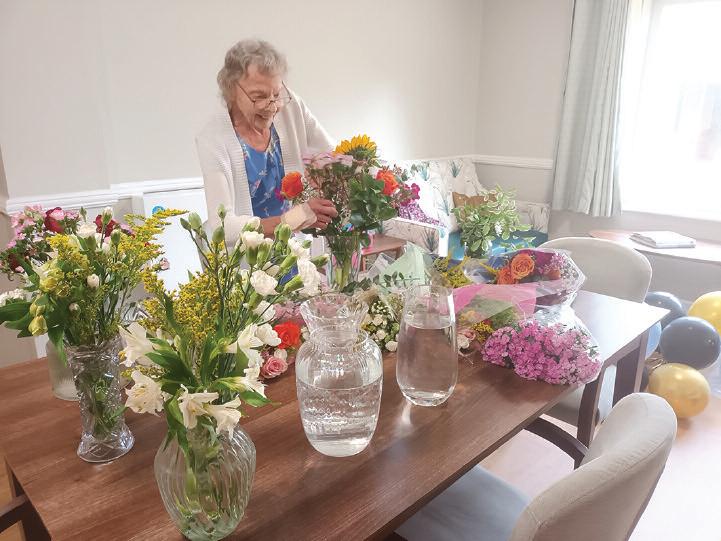
Ruth doesn’t have a single favourite flower; she loves all blooms appreciating the unique beauty of each when they are in season a philosophy she carried into her work at the church However she does admit to having a soft spot for roses, a classic choice that reflects her timeless style
At Ashlynn Grange Ruth gets a lot of pleasure from arranging fresh flowers carefully placing them in vases and maintaining their freshness with daily care She diligently snips the stems and replaces the water
as needed ensuring the arrangements last as long as possible Ruth's dedication means that the care home is filled with vibrant fresh flowers brightening the days of all who live and work there
Beyond her floral duties,

the rest of their lives the way that they intended In 2023 HC-One s Catering
and
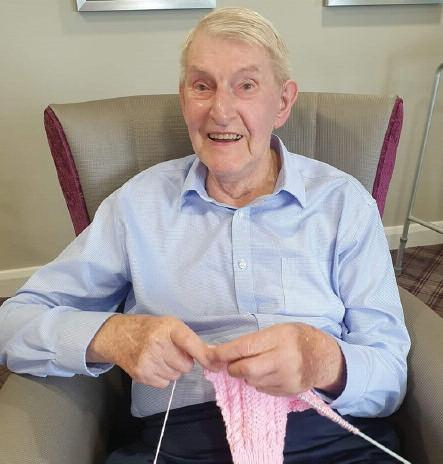

Scottish Health secretary Neil Gray has been urged to drop plans for a National Care Service (NCS) as it emerged the proposals have already cost the taxpayer over £28 million and comes just days after councils withdrew support for proposed legislation in a major blow to ministers
Scottish Labour’s Jackie Baillie told the Scottish Parliament that to date all there is to show for the NCS is botched legislation
The service which has already been delayed by three years would see the transfer of social care responsibility from councils to a new national service
Ms Baillie told the health secretary that the Scottish Government hadn t been listening to Cosla and that the more than £10m that has been spent on creating the bill “will not make a difference to social care now while care packages are being cut direct payments slashed services are being removed and staff are leaving”
Mr Gray said it is “disappointing that Cosla has taken this step” and described it as “pre-emptive” and said that the government had already made substantial changes to the proposals at their request of local
authorities
“Uppermost in our minds and I am sure in theirs is the need of the people who rely on care services,” he said Council body Cosla said its members had concerns about the proposed legislation and that several organisations – including those in the care sector – had expressed doubt over the government s approach
The GMB and Unison unions also withdrew their support for the proposals earlier this month
Ms Ballie contended that the proposed bill doesn t resemble the recommendations of the Feeley Review and that the latest withdrawal follows that of all three social care trade unions while it faces criticism from NHS chief executives and board chairs
She said: The substance of the bill is to create another quango which is not expected to be established until 2028 or 2029
It does nothing to improve social care just now
Scottish Conservative deputy health spokeswoman Tess White said:
Enough is enough the nationalists need to pull the plug on their unaffordable centralised power grab which no-one supports before a further penny of scarce resources is wasted
“It’s just common sense that every penny allocated to this flawed bill should be given to cash-strapped councils who understand local care needs far better than SNP bureaucrats

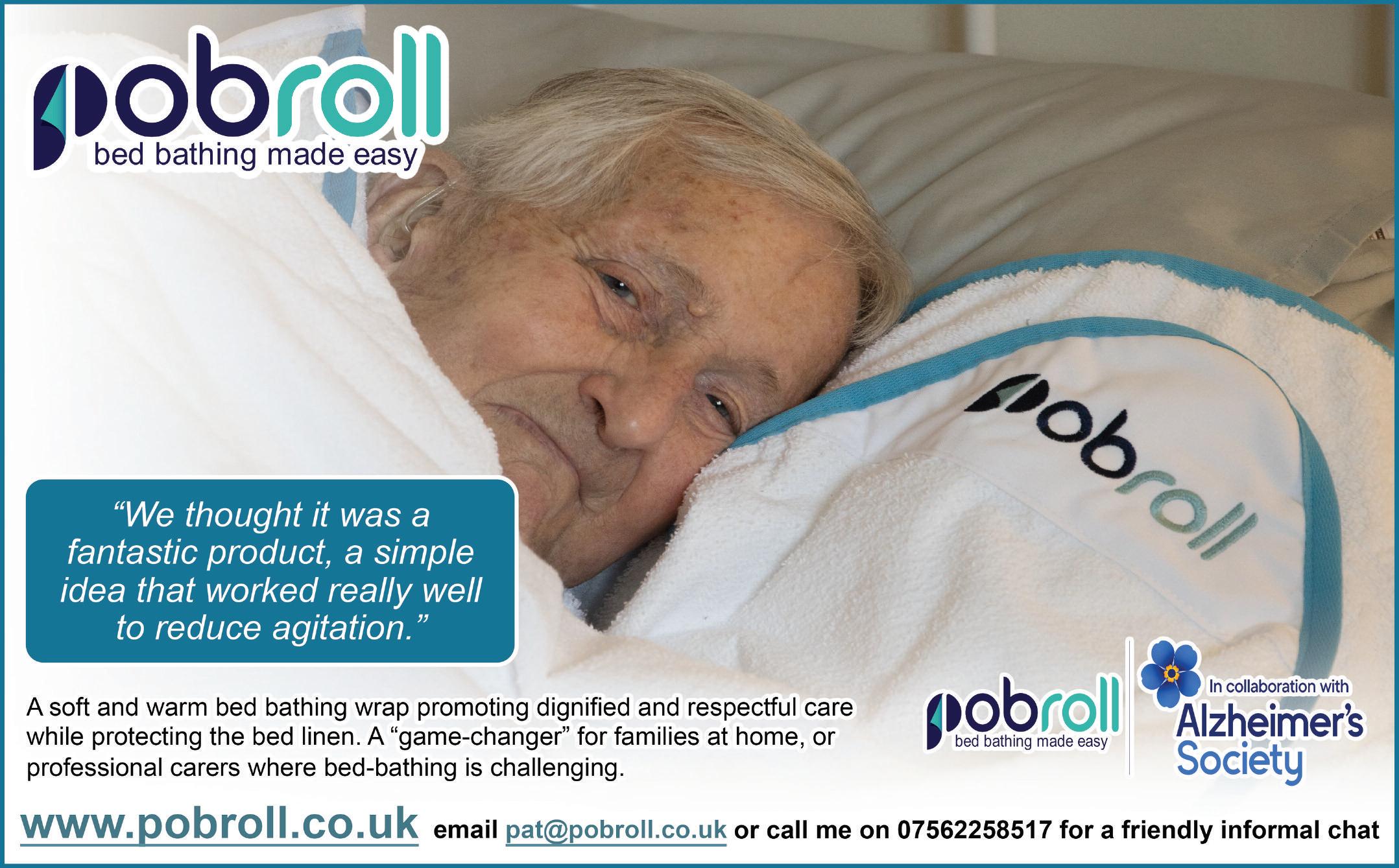
major new survey from the NHS Confederation of integrated care system (ICS) leaders has found that while nine in 10 are committed to shifting more care out of hospitals there are widespread concerns that a lack of long-term investment and planning is holding them back
They support the government s ambitions and want to increase investment in primary care and community services to prevent worsening ill health, as well as designing new models of care to keep patients out of hospitals
Without this they will continue to be trapped in a short-term cycle of having to make budget cuts rather than focusing on delivering care transformation ICS leaders warn that new directives on national priorities tend to focus on short-term performance and financial issues, which, while important, risk crowding out a concurrent focus on the longer-term changes they know are necessary to put the NHS on a more sustainable footing ONE OF THE MOST COMPREHENSIVE SURVEYS OF ICS LEADER OPINION, MADE UP OF CHAIRS AND CHIEF EXECUTIVES ACROSS ICBS AND ICPS AND WITH RESPONSES FROM OVER 85% OF ENGLAND’S ICSS, FOUND:

where unclear accountabilities can lead to confusion and duplication
These findings come after the Lord Darzi report highlighted that while a top-down reorganisation isn t wanted or needed the NHS has work to do to get a clearer accountability structure
Kathy McLean chair of the NHS Confederation’s ICS Network said: ICS leaders are very positive about the impact they are having and the many examples in the report show the progress that is being made They are committed to delivering their four purposes including shifting care closer to home and reducing inequalities in health outcomes
“But as this report makes clear there are barriers that the government and NHS England need to help us overcome if this vision is to become a reality
“Not only do they need more support to bring about these changes, but they need the freedom to focus on the long-term goals necessary to put the health and care system on a sustainable footing
“ICS leaders accept that short-term performance and financial issues need to be addressed on behalf of their populations But the focus on NHS finances risks crowding out the longer-term transformation ICSs were established to deliver ”
Nine in 10 ICS leaders say their local system has made a strategic commitment to shift the allocation of resources to allow more people to be treated in their local community and access more care closer to home But only 54% said they had made progress towards this
• Nearly nine in 10 (87%) say they will not be able to meet their ambitions within their current budgets
Around 86% of leaders said they were worried the financial position of their local authorities will affect the delivery of their ICS s ambitions
Only four in 10 leaders believe that accountabilities are well defined between ICSs and NHS England –this is despite ICSs having been established three years ago This lack of clarity continues to cause confusion especially when it comes to oversight of the performance of NHS providers
One integrated care board chief financial officer told the NHS Confederation that a relentless focus on NHS finances “today” can inhibit “building for tomorrow” and several ICS leaders highlighted examples of
Sarah Walter director of the NHS Confederation s ICS Network said: ICS leaders welcome the government s commitment to transferring care closer to home
“But they need the tools and support to make this happen and these aren’t yet in place ICS leaders are still having to prioritise short-term funding and performance over the long-term changes they know are necessary to put the NHS on a sustainable footing
ICS leaders are positive about the impact they can make and want to make this shift but it is difficult to move resources from acute trusts in particular when those trusts are struggling to meet demand with their current funding
“ICSs and national government can be key delivery partners in making these changes which are the only way to put the health and care system on a sustainable footing and improve the health and prosperity of the nation
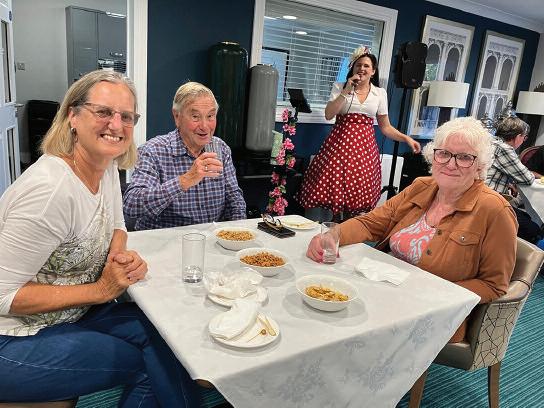

Non-Intrusive
Jawaheer Director of CAREVision adds This integration empowers care homes to be

Care England responds to Secretary of State for Health and Social Care Wes Streeting’s speech at the 2024 Labour Conference in which he emphasised the need to address the social care crisis and highlighted the Fair Pay Agreement
Reacting to the comments Professor Martin Green OBE Chief Executive of Care England, says: “It is encouraging to see the government recognise the urgent need to address the challenges in social care However it is crucial to understand that social care cannot merely be viewed as a mechanism for alleviating pressure on the NHS; it deserves dedicated attention and investment in its own right
The comments made by the Secretary of State will go a long way towards creating a transformed social care sector With confirmation that he and the Deputy Prime Minister will deliver a new deal for care professionals in the form of the Fair Pay Agreement to improve pay and conditions we are hopeful that the government recognises that such ambitions should be more than lip service

This speech follows Prime Minister Keir Starmer s poignant anecdote about his sister’s role as a carer, he used to highlight the invaluable contributions of the care workforce
Martin Green Continued: “The Prime Minister’s heartfelt acknowledgment of his sister s work as a care worker during the pandemic resonates deeply with all of us in the sector It’s a powerful reminder of the essential role that care workers play in our society – often underappreciated yet undeniably vital
We wholeheartedly agree that
To truly effect change the Fair Pay Agreement must be accompanied by a detailed and realistic funding plan Without it there is a significant risk that our ambitions for fairer pay and better conditions could fall short perpetuating the very issues we seek to resolve ”
“In Ever y Way, I’m
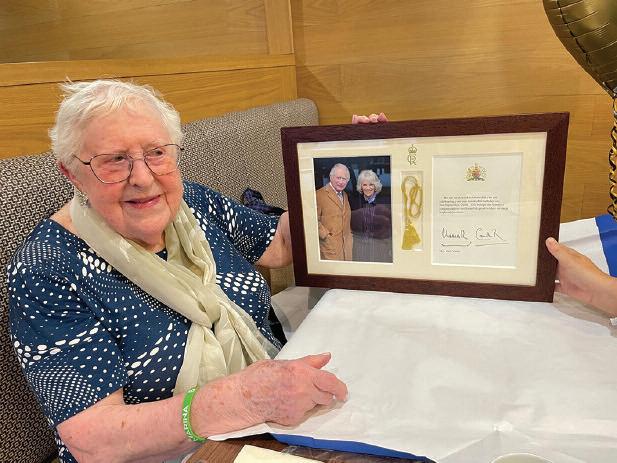
Senior leaders across Exemplar Health Care recently celebrated graduating as the first cohort of the organisation s bespoke Leaders 4: Inspire’ training programme
The Leaders 4: Inspire programme is designed to equip experienced leaders with new and enhanced skills to enable them to drive innovation and inspire their teams Regional Directors and Commissioning Managers from across the UK-wide organisation were the first cohort to participate
The programme is part of a wider suite of leadership programmes delivered through the newly formed Exemplar Health Care Academy each crafted to nurture talent embed quality leadership skills at every level of the organisation’s workforce, and support succession planning to ensure sustainable growth and the future success of all colleagues
Leaders 4 Inspire commenced in October 2023, and saw the cohort engage in workshops on leadership and communication styles and financial competence encouraging leaders to make positive shifts in team dynamics and act on business insights

The next stage was a practical workshop on coaching skills designed to instil valuable mentorship skills and encourage the cohort to inspire the next generation of Exemplar Health Care leaders
Leaders then progressed to a module on strategic change using real-world case studies to craft impactful initiatives and exploring how psychological factors can impact people’s reactions to change
The cohort began the final module earlier this year learning how to transition from working in the business to working ‘on’ it, ensuring innovative strategies are effectively delivered and brought to life
The graduates were proud to have successfully completed the programme and look forward to implementing their newfound skills to make a meaningful difference in their teams
Mark Rushton Regional Director of Operations at Exemplar Health Care and Leaders 4: Inspire Graduate
said:
“I am pleased to have completed the Leader 4 Inspire programme and I cannot wait to begin putting everything I have learnt into practice
“Each module felt incredibly valuable to the entire cohort and our participation has been a great reminder that learning and development are an essential part of success for everyone in an organisation no matter
their role or experience
Exemplar Health Care s Leadership Pathway programmes are as follows:
Leaders 1 Aspire - designed for Senior Health Care Assistants
Registered Nurses, and aspiring managers, this programme focuses on the foundations of leadership including personal effectiveness leading a team and effective coaching
Leaders 2: Engage - targeted at Unit Managers and first line managers this programme supports new managers through modules around getting the best out of a team high impact coaching effective delegation and managing the employee lifecycle
Leaders 3: Accelerate - geared towards Home Managers, Deputy Managers Clinical Nurse Managers and senior managers in Central Services, this programme builds on the skills of our senior managers, with modules including coaching for high performance having courageous conversations and leading change
Leaders 4: Inspire - tailored towards leaders of leaders including Regional Directors and Heads of Departments this programme takes leadership to the next level focusing on strategy development and execution, leading strategic change and building high performing teams
The Leaders 2: Engage programme is already underway for every Unit Manager across the organisation and applications for the Leaders 1: Aspire and Leaders 3: Accelerate programmes are due to open in the coming months
Rob Coxon, Director of the Exemplar Health Care Academy, reflected: We owe it to our service users and our colleagues to have highly trained and effective leaders We are proud that our Regional Directors and Commissioning Managers have led from the front by graduating as our first Leaders 4 Inspire cohort
Ten days off-the-job learning is a big investment and the programme underpins our partnership with the world-leading Virginia Mason Institute, which aims to build a sector-leading culture of safety and continuous improvement
“The ripple effect of their development will reach every corner of Exemplar Health Care, making every day better for both our colleagues and the

Participants
The Care To Cook campaign has been specially designed by the charity to inspire people who access social care and their support teams to learn new skills, gain confidence and have fulfilling experiences through cooking At the heart of this is
co uk – a unique hub that offers accessible recipes supported by high quality videos starring people supported by the charity and easy read guidance The website provides a host of life hacks to help people reduce
food waste shop and meal plan with independence and build skills in the kitchen
Rosemary said I m so delighted and proud to be an Ambassador for Community Integrated Care’s Care To Cook campaign I really believe that cooking is for everyone and the resources and experiences created for Care To Cook will inspire and empower thousands of people to get creative in the kitchen The recipes are budget friendly, nutritious accessible and there s something for everyone There s nothing to stop you - it s time to cook!
John Hughes, Director of Partnerships and Communities at Community Integrated Care, said, “We’re thrilled to have Rosemary join us not only to lead this fantastic experience but also as a passionate Ambassador for Care To Cook Cooking is more than just a life skill; it s a way for people to express themselves make healthy choices, and connect with others through food This initiative proves that delicious and nutritious meals can be achieved on any budget I’m excited to see how Rosemary s cooking session and the wider Care To Cook program will empower individuals across our charity and the social care sector inspiring confidence joy and wellbeing through the power of cooking ” Visit www CareToCook co uk to find out more

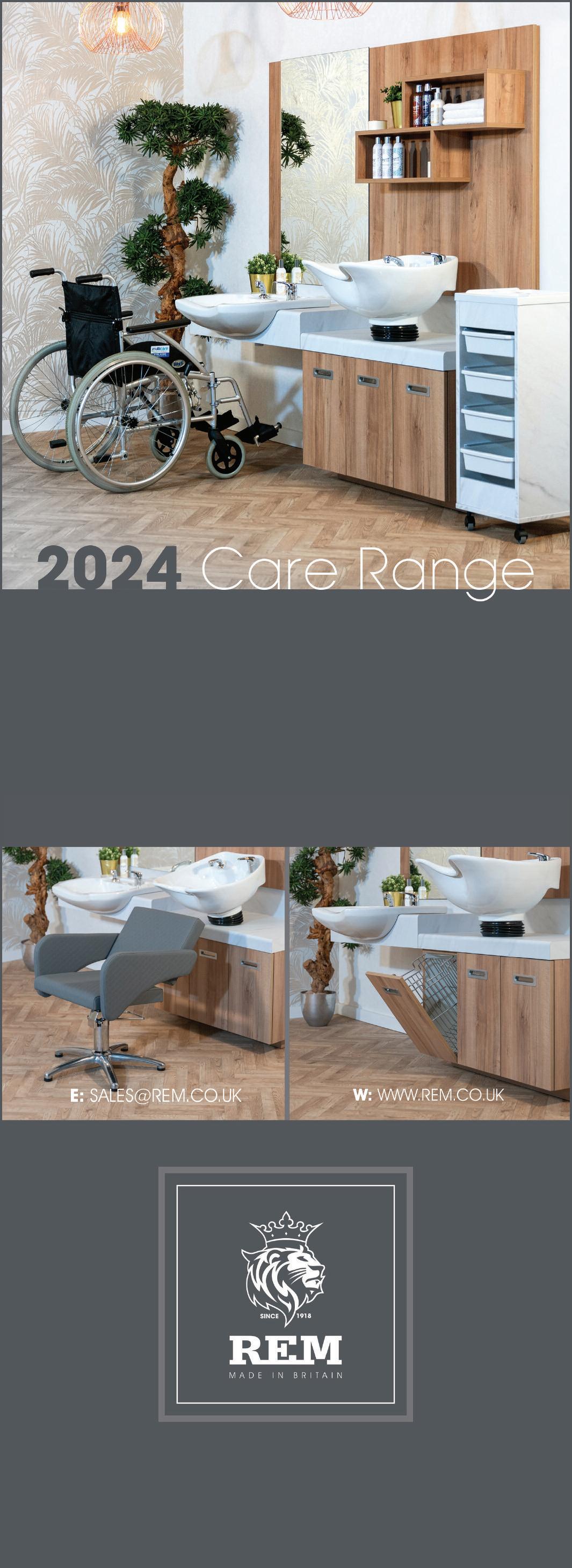
REM have been manufacturing furniture for the Hair & Beauty Sector for over 100 years and are now considered to be one of the largest manufacturers in both the UK & Europe Understanding the growing requirement for Care & Residential Home Salons, REM’s Design Team have produced the Pendle Care Range for the Small, Compact Care Home Salon

This year’s Labour Party Conference saw a host of MPs and social care leaders come together for a discussion about the future of social care innovation
The event was jointly organised by the Social Care Institute for Excellence (SCIE) and social care communications experts PLMR in hopes of bringing social care to the forefront of the week’s conversations and policy agendas
The panel included Anna Dixon MP for Shipley, who has formerly served as an advisor to the Department for Health and Social Care and as CEO of the Centre for Ageing Better; Ben Coleman MP, who formerly held the role of Cabinet Member for Health and Adult Social Care in Hammersmith and Fulham; Dr Clenton Farquharson CBE Associate Director of Think Local Act Personal (TLAP); and Sarah Jones Chief Executive Officer of Anchor
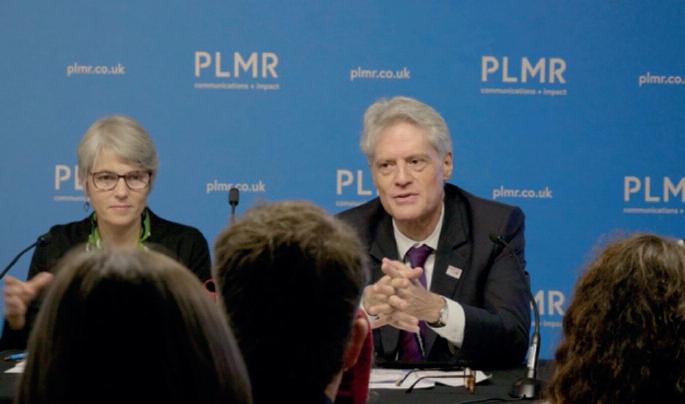
Chaired by SCIE’s Chief Executive Officer, Kathryn Smith, the panel discussion explored how we can overcome barriers to innovation in social care Far from just discussing the role of technology, the broad discussion covered everything from integration to breaking down silos, funding the role of the workforce improving local areas to be more accessible and the relationship with the NHS
The 100-capacity venue was standing room only as audience members crammed in to enjoy hearing from the panel s two recently elected MPs about their experiences of social care innovation that they are bringing to Government
Ben Coleman MP shared his insights on how he led Hammersmith and Fulham to become the first place in England to provide universal free care at home during his time as a Councillor in the borough He stressed that the way to innovate and build a National Care Service is to work with people with lived experience of care and those who work in the sector
Anna Dixon MP highlighted her 25 years experience working in social care to improve access and reduce inequalities which she will bring to her new role as a Parliamentarian She told the audience that for too long people have not been able to get the care and support they need and that the new Government
recognises social care is essential to their missions and to economic growth
The range of panellists provided multiple perspectives from Local Government Advocacy Provider and Policy Experts Sarah Jones CEO of the UK’s largest not-for-profit provider Anchor talked about the importance of the care provider voice being included in local and national conversations about care reform She stressed that innovation goes far beyond technology and called for collaborative action to get the simple values and basic principles right using the tools available to us
The highlight of the event was a powerful question and answer session with the audience during which people shared their personal experiences and ideas for enhancing the healthcare system
Dr Clenton Farquharson Associate Director of Think Local Act
Personal (TLAP) closed the event with a powerful reflection: This is about people’s lives The stories we’ve heard today are about wanting to live a gloriously ordinary life The role of Government is to create the conditions that enable us to live that life, and I hope that we will be part of that discussion in true co-production not just partnership Disabled people at a local level often know a lot about the issues but there isn t the funding to help them to be part of
Commenting

Triton Showers has been presented with a King’s Award for Enterprise recognising the brand’s commitment to sustainable development and integrating sustainability into its long-term business strategy and Net Zero goals
The Nuneaton-based shower manufacturer was presented with the achievement by the Warwickshire Lord Lieutenant, Tim Cox, on Wednesday 4 September at its Shepperton Business Park head office
The King’s Award for Enterprise celebrates Triton’s ongoing efforts to reduce its carbon footprint and environmental impact Triton is one of only 29 select organisations to be recognised nationally for its contribution to sustainable development, having received the news earlier this year Lord Lieutenant Tim Cox praised Triton's achievement “It has been an honour to meet with this year s winners of the King s Awards for Enterprise These Awards are a great boost to the local
and show our ability to attract and sustain successful companies

businesses as possible to consider applying These awards are the highest accolade available to UK businesses and offer unparalleled prestige exposure and credibility to successful companies
David Tutton, Managing Director at Triton Showers, said, “We are incredibly honoured to receive the King s Award for Enterprise being one of only 29 select businesses across the UK to be recognised by His Majesty this year in the Sustainable Development category This prestigious award underscores our commitment to placing sustainability at the heart of our business strategy and our determination to achieve our ambitious


to access
Earlier this month the Swindon and Wiltshire Innovative Technology Care Hub (SWITCH) held a training day for local Care Professionals working through Curam, the UK’s largest digital employment platform for the care sector to upskill and improve care provision in the region Care Professionals who work through Curam from Wiltshire Gloucestershire Hampshire Oxfordshire and Berkshire attended SWITCH s three-hour Wound Care training session achieving a collegelevel certification at the end of the day During the course, Care Professionals learnt about skin integrity and how to spot changes such as pressure wounds, as well as the initial response required to prevent infection whether that is basic treatment or referral
Using realistic task trainers in SWITCH’s interactive learning suite Care Professionals were given an accurate and bespoke sense of what wounds may look like on their clients and how they should react The session highlighted how skin wounds manifest on different skin types to instil cultural competency

birth control, to ensure she didn’t have a large family, a practice she encouraged her daughters to follow when they married
Asked about her life, Eva said: “I ve always believed in staying active –physically and mentally – and keeping good friends close Dancing and taking the stairs have kept me fit all these years You need to keep your mind active too I enjoyed my work even meeting my husband at one job and being inspired to find a passion for art
“So much has happened in my lifetime, so much has changed Some for the better some for the worse The nuclear bomb was horrific and
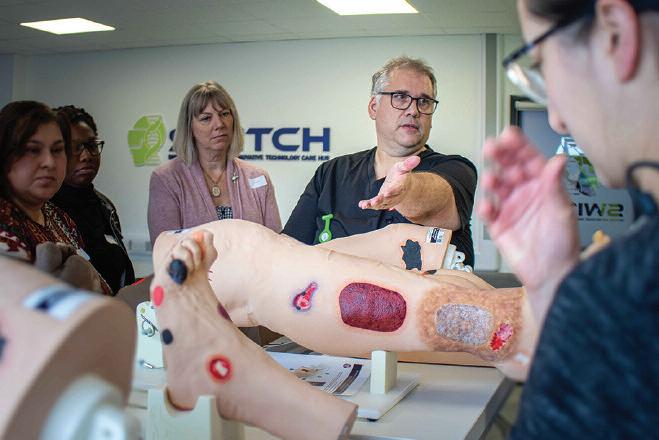
The immersive suite at SWITCH simulates healthcare environments through projections, smells and a family of life-like manikins which can talk cough cry and realistically react to care interventions This helps Care Professionals develop healthcare skills and softer skills such as patient interaction in a simulation setting The hub was funded under the Skills Development Fund from the Department for Education SWITCH provides mandatory and clinical skills training to upskill care professionals across the region
The session also acted as a networking opportunity allowing Care Professionals who work for Curam on a self-employed basis to come together as a team and share experiences and best practices
The initiative reflects Curam and SWITCH’s shared ethos of improving care provisions in the UK by ensuring everyone has access to high-quality care through upskilling and training and using technology to facilitate this
SWITCH aims to enhance and upskill health and social care workers in the area with cutting-edge technology-driven facilities and equipment in simulation hospital wards Augmented reality, virtual reality and manikins that have humanistic features and can react to the care given give Care Professionals hands-on experience and the opportunity to practice highrisk scenarios in low-pressure environments
Ashley-Louise Lumley a Swindon-based Curam Champion and organiser of the training day, said “SWITCH’s training

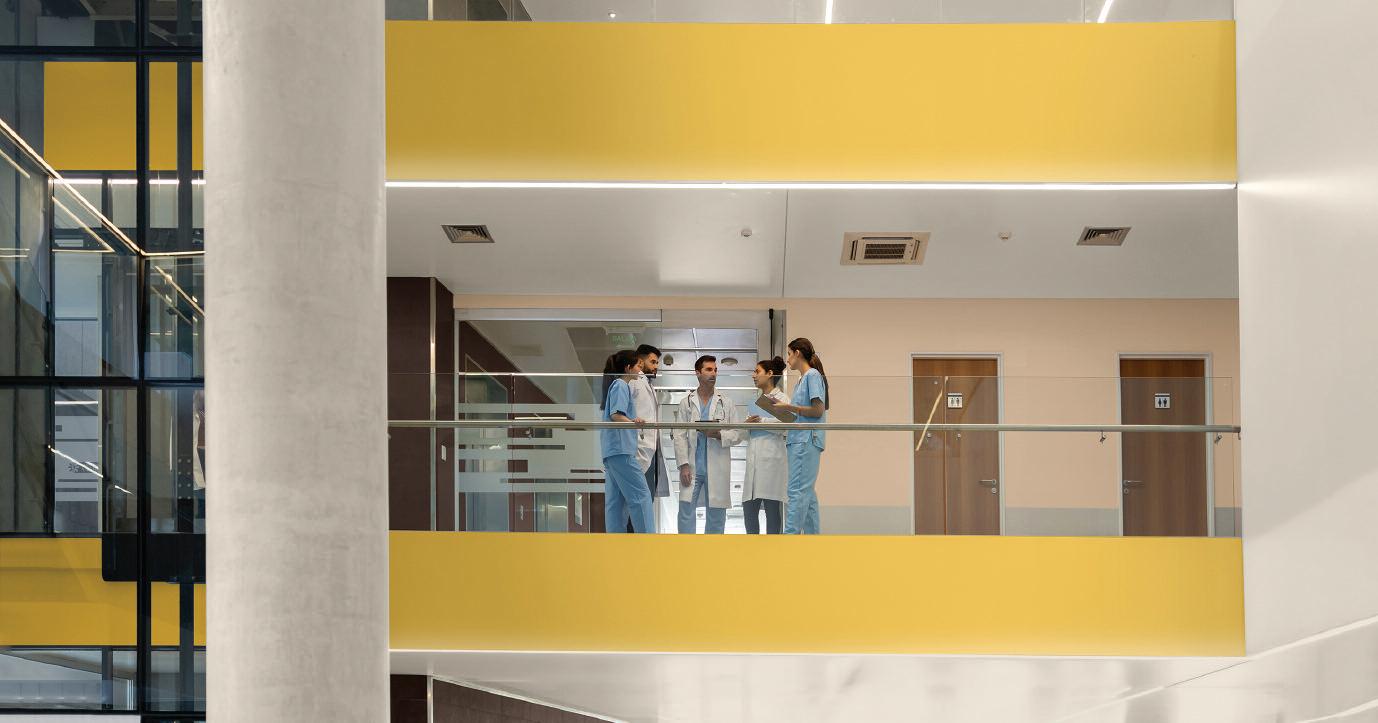
For 2025, Dulux is asking architects, specifiers and designers to embrace yellow and infuse a sense of optimism, pride and imagination into their projects As a guiding light to introduce these bold, positive shades to clients, the paint manufacturer has announced True Joy as its Colour of the Year for 2025, which is complemented by three versatile ColourFutures™ palettes
Over that last two decades, the Dulux Colour of the Year has been chosen through extensive trend research by Dulux colour experts and international design professionals The 2025 selection, True Joy™, is a bright and positive yellow that reflects people’s desire to break free, reset, and create something new and exciting As well as embracing True Joy™, Dulux is also encouraging designers to share the joy of yellow and help clients to leap out of their comfort zone - and feel confident in doing so
Yellow shades like True Joy™ can be used as a bold statement colour or an accent hue However, to help designers advise their clients on the best colour pairings, Dulux has created three supporting ColourFutures™ palettes
● Bold Colour Story: Inspired by the thrill of adventure, these bold colours bring spontaneity and energy to any space Bright blues and oranges contrast beautifully with accent yellow, making them ideal for educational and office environments where inspiration and creativity are key

● Human Colour Story: Celebrating artisanal craftsmanship, these shades of wood and clay reflect the raw materials used in handmade processes Perfect for educational and healthcare settings, these colours add a touch of authenticity and warmth
● Proud Colour Story: Drawing inspiration from diverse cultures around the world, these deep, rich and earthy browns and greens celebrate the rich heritages that make us unique Ideal for hospitality and residential spaces, they create a welcoming atmosphere where everyone feels at home

Dawn Scott, Dulux Trade Senior Colour Designer, said: “True Joy™ and its accompanying palettes offer a fresh perspective on colour's role in shaping our built environment These colours are not just trends but tools for architects and specifiers to craft spaces that resonate with the values and visions of their clients, improving our experience within the spaces we inhabit
“One of the most impactful applications of True Joy™ is within healthcare environments Paired with the earthy, natural shades of our Human Colour Story, True Joy can transform waiting rooms, corridors, and communal areas into uplifting and calming spaces This combination not only brightens the atmosphere but also connects patients and staff to a sense of warmth, creativity, and well-being ”
Marianne Shillingford, Creative Director and Colour Expert at Dulux, explains: “It may be difficult to
immediately picture where yellow paint could seamlessly slot into your home, but it’s actually much more versatile than you may first think The decision to choose the most uplifting hue in the spectrum is to spark inspiration and instil confidence to leap into the unknown and endless possibilities of what could be Whilst yellow is one of the bolder colours on the spectrum, True Joy™ is complementary to a vast range of palettes, it brings out the positivity in even the most neutral of shades and is the figurative glue that binds more daring colour stories together ”
To support specifiers and provide additional guidance on the use of True Joy™, Dulux has created the Dulux Trade Colour of the Year 2025 Specifier Guide which includes mood boards that can be used to help create the perfect space across any sector Architects, specifiers, and designers can also use the Dulux Trade Colour Schemer for colour inspiration or to create specifications for projects They can also speak with the Dulux Commercial Colour Services team for additional advice on how to use the Colour of the Year 2025

Dulux is proud of its ongoing efforts to produce durable solutions in a more sustainable manner By focusing on reducing carbon emissions and increasing the circular use of materials, Dulux ensures that products like True Joy not only enhance spaces aesthetically but also contribute to a greener future With initiatives such as using up to 70% recycled content in packaging and developing water-based paints with lower VOC content, Dulux is dedicated to helping professionals create beautiful, sustainable environments
Dulux Colour of the Year 2025 True Joy™ and the accompanying palettes will be available for purchase from10 September 2024
For more information, visit duluxtrade.co.uk/cf25 and follow #CF25 on social media

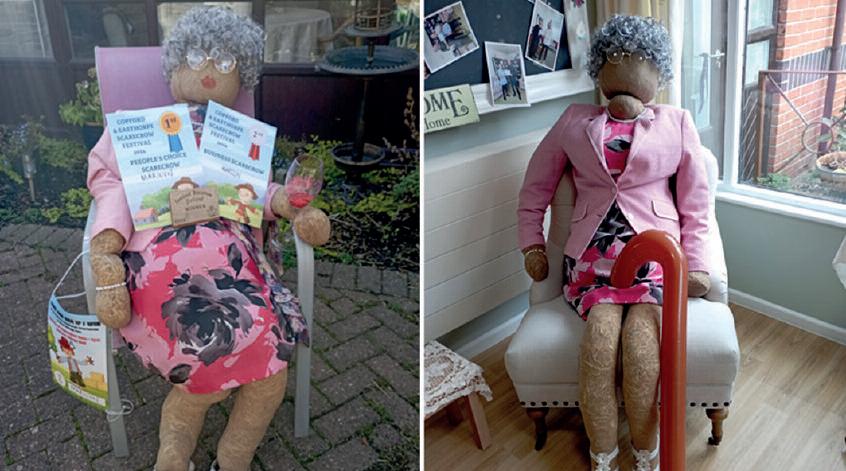
“We
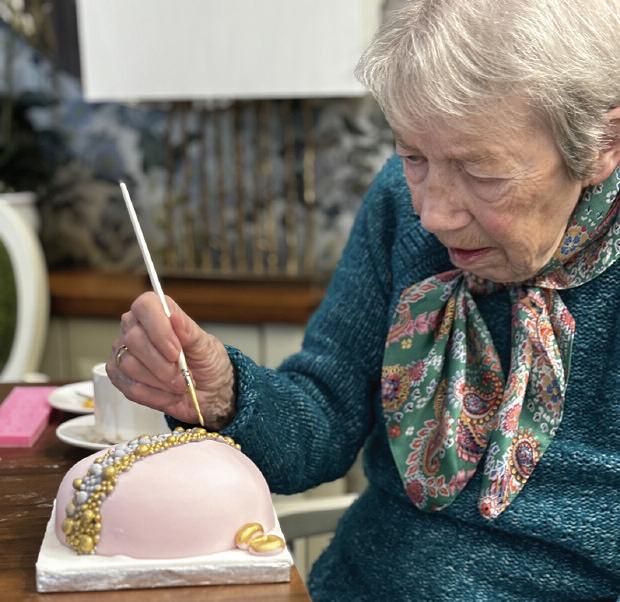

On a magical Saturday afternoon, Avocet Court Care Home in Ipswich was transformed into an enchanting fairytale setting as part of Athena Care Homes 10th-anniversary celebrations
The event aptly named Once Upon a Time was a magical experience for residents, families, and the local community who gathered to witness a wish come true for one special resident, Sylvia Ratcliffe
As part of Athena Care Homes' Making Moments campaign which encourages residents to share their wishes Sylvia asked for a ride in a horse-drawn carriage To her amazement her wish was granted in spectacular fashion and the entire home and team worked together to create a magical day she will never forget Sylvia, who has been a resident at Avocet Court for the last three years, was accompanied by her daughter grandchildren and great-grandchildren as the first person to be treated to an elegant ride in a glass carriage fit for a Disney princess around the streets surrounding Avocet Court
Her excitement was palpable and there were a few tears of joy as she climbed into the stunning horsedrawn glass coach, complete with footmen - a scene right out of a storybook
Reflecting on the experience Sylvia said It was absolutely amazing I certainly never thought anything like this would happen for me And to share it all with my family and everyone at Avocet Court was like a dream come true A big thank you to everyone who helped make my moment happen ”
The coach was one of the many highlights of the day capturing the hearts of all who watched Sylvia s wish unfold
It was a fairytale day for all to enjoy as Avocet Court was transformed into a wonderland of activities and entertainment, with something for everyone Residents, the Avocet team, and visitors alike delighted in a range of enchanting experiences including:
featuring artwork by Gina, a talented member of the laundry team
Robin Hood s archery: Lifestyles team member Andy took on the role of Robin Hood, leading a crossbow archery experience that was a hit with both young and old
Hunt the glass slipper: An interactive scavenger hunt around the grounds where guests searched for Cinderella’s missing glass slipper • Disney dress-up: Many members of the Avocet Court team and visitors alike dressed as beloved characters including Snow White Sleeping Beauty, Cinderella, Belle, Princess Merida from Brave, and even a Minion Their costumes brought an extra layer of magic to the day as they mingled with guests and posed for photos
The event also featured party games face painting bow and arrow making and live music from a fabulous singer ensuring that the fun lasted throughout
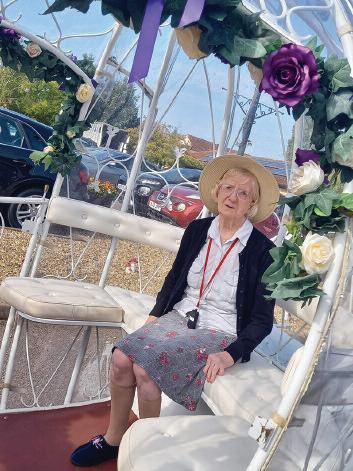
Manager
the winning artwork
Garnham
and
and

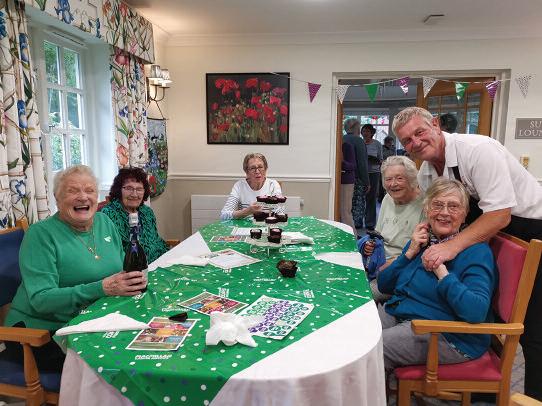
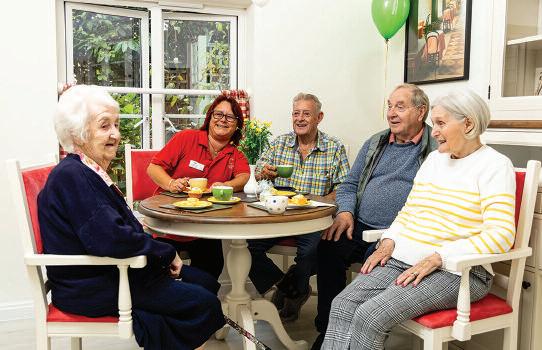

Items from the Woodpeckers residents included a triptych by Karen Ball inspired by the gardens of Stourhead and sculptor Barbara Hepworth’s garden in Cornwall, all hand embroidered in silk and cotton
Fellow artist Rosemary Pope, a former member of
Woodpeckers
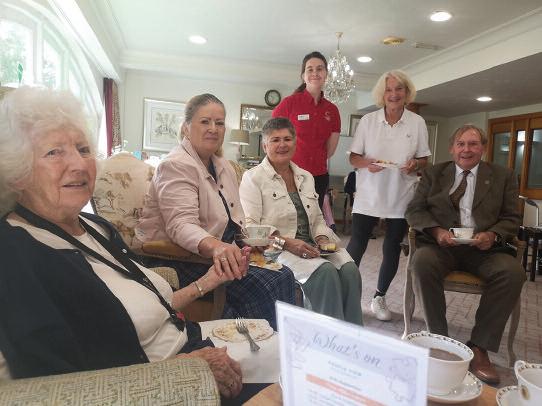
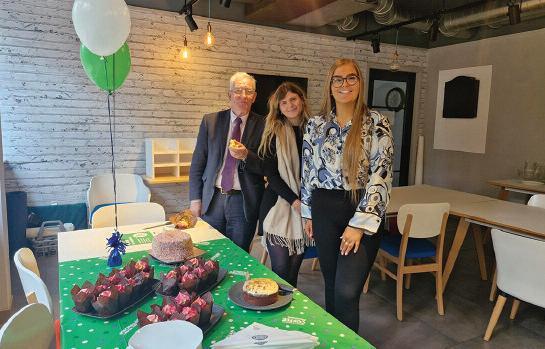


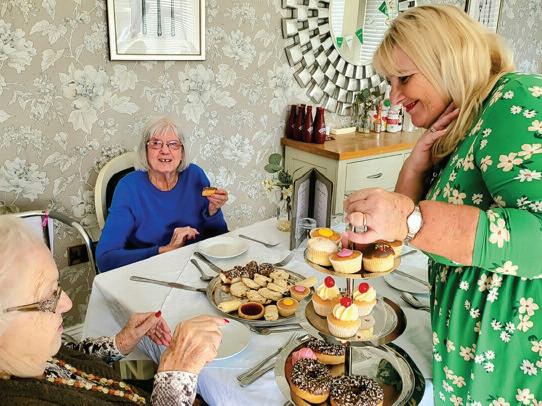

quiches, sandwiches, coffee and tea

Hundreds of pounds were raised for a cancer charity when care home residents from across Teesside got together for coffee and games
Elderly residents staff and family members from four Hill Care Group care homes in Middlesbrough Stockton-on-Tees and Saltburnby-the-Sea got together to fundraise for Macmillan Cancer Support
Eston Lodge Care Home Hazelgrove Court
Care Home, The Gables Care Home, and Ingleby Care Home held the joint coffee afternoon event at St Francis of Assisi Church hall Barwick Way
Thornaby
Attendees enjoyed games of tombola a raffle guess the number of sweets in the jar guess the name of the dog and lots of cakes scones
The highlight of the afternoon was a game of Spanish bingo and a sing-along In total the event raised over £350 for the charity
Norma Watson 92 from Ingleby Care Home said: It was a fabulous afternoon and I was so glad I
Olive
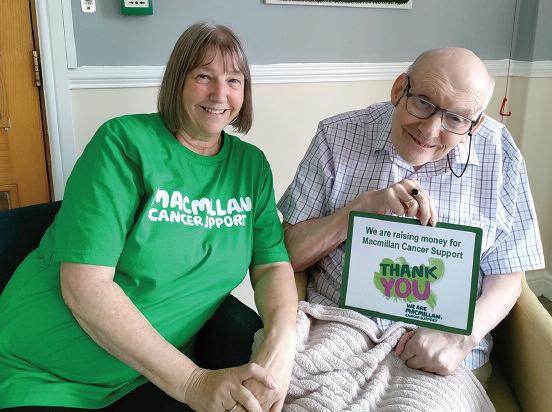


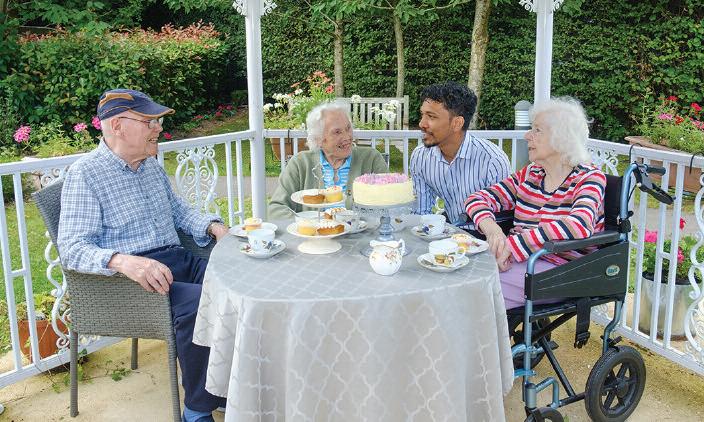
of music to those who need it most, providing a therapeutic and fun-filled experience
Funds raised during the coffee morning will go directly to MacMillan Cancer Support, helping them continue their vital work in supporting individuals and families affected by cancer
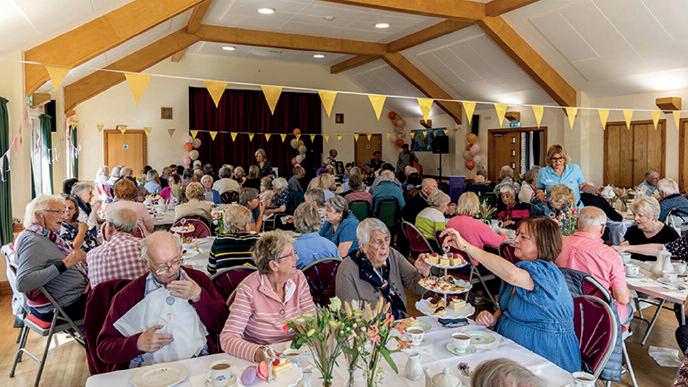
French-costumed New Milton group Café Mondial
Residents from five New Forest care homes joined families and friends for a French-themed afternoon tea that raised hundreds of pounds for charity Parkinson’s UK Boldre War Memorial Hall was transformed into a Parisian-style restaurant as the parties from Colten Care and other community organisations sampled homemade patisserie delights
More than 100 guests listened and danced along to traditional French songs played live on accordion guitar and double bass by
Advance tickets on-the-door entry and donations helped the event raise £700 for the New Forest Branch of Parkinson s UK
One resident of Linden House, Colten Care’s dedicated dementia care home in Lymington, Liz, said: We had smiles on our faces all afternoon clapping and dancing We absolutely loved it It was wonderful from start to finish ”
Residents from fellow Lymington homes Court Lodge and Belmore Lodge plus Kingfishers in New Milton and Woodpeckers in Brockenhurst also enjoyed the occasion Community guests included members of a French language group in Lymington set up in relation to the
town’s official twinning partnership with Vitré in Brittany
Peter Doyle, Colten Care
Operations Manager who later presented a cheque with the proceeds to a meeting of the Parkinson s UK branch, said
It was an absolute pleasure to help put on such a happy successful occasion for our residents the Parkinson s group members and the local community
It was great to chat to people who had a good time enjoying the chance to relax meet friends and listen to very talented musicians at what was an amazing event ”

Martin Hall-Patch Chairman of the Parkinson’s UK New Forest Branch said: “The atmosphere in the room was amazing with a strong buzz of conversation throughout and this coupled with the music of Café Mondial, demonstrated that a good time was being had by everyone present
It was a truly memorable occasion and an excellent afternoon s entertainment This was only made possible by the ceaselessly professional yet personal way the Colten team carried out their duties and the hard work that went into making it all happen so well
“Everyone I spoke to said they enjoyed the afternoon and it was clear from their faces that the Colten residents felt the same ”
New CHSA campaign designed to inform buyers and end users of cleaning chemicals of the value of regulations
The Cleaning & Hygiene Suppliers Association has launched a campaign designed to spread the word about the importance of regulations when buying cleaning and hygiene chemicals
Compliance with formal UK Government European Union and industry-standard regulations is essential if buyers are to be certain product claims are legitimate and proven Adherence to regulations guarantee safety They underpin transparency and ensure consistency They support buyers informed decision making by providing a framework for comparison so a buyer really knows if they are getting the product or solution they need They also provide accountability giving buyers a route to recourse if needed In short they underwrite an ethical
approach
Buyers and end users can also turn to regulations to be certain they are not misled by environmental claims in the rush toward sustainable solutions
Lorcan Mekitarian Chair of the Cleaning & Hygiene Suppliers Association said: Buyers and end users need to be able to trust the product and sales and marketing claims They need to be certain of the balance between efficacy and sustainability and they need to make sure they are using the right product for the job in hand They are not chemists however so may be misled by seductive sales and marketing messaging

“Our advice is to talk to your manufacturer and ask for evidence to support their claims This will come in the form of their technical data sheets, third party verifications and certifications and, importantly, proof of regulatory compliance ” Gobble-de-gook or undefined phrases to be wary of include: ‘non-renewable chemicals’ ‘chemical-free’ ‘natural’ ‘five times filtered water’ and ‘non-toxic’ ‘Biodegradable’ is also a confusing term As applied to cleaning products it is defined in current legislation (Detergent Regulation (EC) No 648/2004 and corresponding UK post Brexit legislation)
Something claiming to be organic should be certified by for example the Soil Association Net-zero claims should be based on the international net-zero standard (https://sciencebasedtargets org/net-zero) or another reliable third party verified certification
Every member of the CHSA has signed our rigorous Code of Practice, which demands our members trade ethically Amongst other stipulations it requires members to: conduct business dealings in an open honest fair and proper manner and in accordance with the laws rules and regulations of the UK and EU ensure all public statements made by and on behalf of the Member are decent honest and truthful ensure no false or exaggerated claims are made verbally in literature electronically or in any other way • hold and provide evidence on request for product and service claims particularly with reference to legislation certifications and accreditations
The CHSA Code of Practice also includes the Competition & Market’s Authority’s Green Claims Code Its principles are summarised as: Claims must be truthful and accurate
Claims must be clear and unambiguous
Claims must not omit or hide important relevant information
Comparisons must be fair and meaningful
Claims must consider the full life cycle of the product or service
Claims must be substantiated
Finally every member of the CHSA s Accreditation Scheme for manufacturers of cleaning chemicals has signed the CHSA s own ethical marketing code
@CHSACleaning www CHSA co uk




mk-hire co uk See the advert on page 19

MOWOOT II – proven solution to chronic constipation without medication
Developed by a team of doctors and other healthcare professionals, MOWOOT II performs gentle abdominal massage to speed up intestinal passage in people experiencing chronic constipation
Clinically proven safe and effective relaxing and sideeffects free MOWOOT II
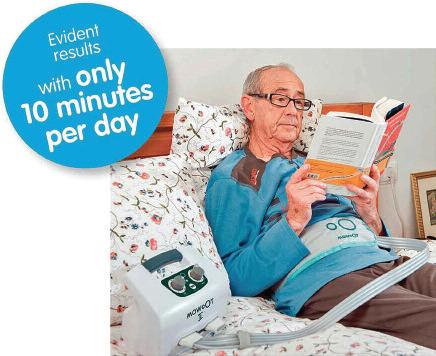
Abdominal Massage Therapy System combats constipation and provides soothing relief to affected people
Easy to use and comfortable the MOWOOT II treats and manages constipation in people with spinal cord injuries multiple sclerosis sufferers Parkinson’s Disease patients and people with constipation related to prescription medication MOWOOT II also helps to relieve idiopathic constipation experienced by menopausal and post-menopausal women

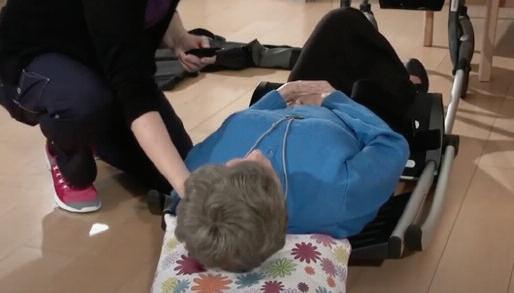
and older and elderly people In clinical studies
MOWOOT II increased evacuation frequency softened stools, improved regularity, reduced gasses relieved bloating and eased off abdominal discomfort 10 to 20 minutes daily of relaxing abdominal massage with MOWOOT II rapidly reduces symptoms of constipation Evident results are experienced only a few days after the first treatment Regular abdominal massage with MOOWOOT II ensures lasting health benefits and better quality of life
MOWOOT II – effective solution to chronic constipation for better quality of life! Supplied



Our Integrity Static Cushions crafted with high-quality materials and innovative design are effective in preventing and managing pressure ulcers by redistributing pressure and minimising skin damage They feature a larger surface area that spreads the user's weight reducing pressure on specific points EasyGo patient lift and transfer chair addresses common issues found in traditional hoists which are often cumbersome and difficult to manoeuvre especially in tight spaces and require multiple staff members EasyGo simplifies the lifting and transferring process enhancing patient dignity and comfort It is designed to move between beds wheelchairs toilets and cars Additionally we have developed a patient transfer seat that can incorporate any Integrity Static Cushion providing optimal pressure relief during transfers

Pressure ulcers are largely preventable with the right approach Our goal is to make your job easier, allowing you to focus on exceptional care and improving residents' quality of life We offer comprehensive product training and support including inperson and online sessions detailed manuals quick-start guides and access to our support team for advice and updates on best practices in pressure ulcer prevention 01457 890 980 | sales@sumed co uk | www sumedinternational com See the advert on the back cover for further information
service

as well as curtains and offers a comprehensive range of shutters
Doug says: “We stock two ranges of silent gliss corded curtain tracks and two ranges of silent gliss uncorded curtain tracks the fitted prices for which are available on this website All of the aluminium silent gliss tracks stock can be shaped and fitted into bay windows, as can some of the poles We also have ready access to many more ranges of both tracks and poles, most of which we can get in one working day “To read more of what our customers say about us please do look us up on Checkatrade checkatrade com/mrtrax
Call now to speak to one of our team on 0800 3345114 or 07968 242004 email us at doug@mrtrax co uk or see the advert on page 8

NCCO International announces the launch of Task Manager an innovative food safety task management and temperature monitoring solution designed for the senior living and residential care home sector Task Manager addresses critical pain points in food safety compliance operational efficiency and resident satisfaction
Task Manager is a game-changer for the senior living industry said Karl Rose Managing Director of NCCO International, "Our system not only ensures compliance with food safety regulations but also enhances the quality of life for residents by guaranteeing safe and nutritious meals
Task Manager assists senior care facilities in adhering to local state, and federal food safety regulations aiming to reduce the risk of foodborne illnesses among elderly residents By providing detailed record-keeping and log management Task Manager supports facilities in maintaining audit readiness facilitating health inspections and compliance checks

Task Manager automates temperature monitoring for refrigerators freezers and food storage areas to help maintain safe limits without manual checks The system organizes food safety-related tasks, such as cleaning schedules equipment maintenance and staff training to help ensure thoroughness With consistent monitoring Task Manager helps maintain the nutritional value and quality of stored and prepared food Real-time alerts for temperature deviations enable quick corrective actions, potentially preventing spoilage and ensuring residents receive high-quality meals For more information about Task Manager please visit www ncco eu or contact David Webster at dwebster@ncco com

By

Malnutrition remains a significant issue in care homes where the elderly are particularly vulnerable As a registered dietitian working in the community and in hospital wards often with elderly people who have experienced fall, I wish more people knew about the prevalence of malnutrition and how to combat it before they ended up in hospital
Recent statistics paint a stark picture: Around one in 10 people over the age of 65 are malnourished or at risk of malnutrition and this figure rises alarmingly to 45% among those in their 90s According to the British Association for Parenteral and Enteral Nutrition (BAPEN) malnutrition costs the UK approximately £23 5 billion annually with older adults being disproportionately affected
As the population ages addressing malnutrition and its associated complications, such as frailty and sarcopenia, becomes ever more critical By focusing on early detection and strategic nutritional interventions, including the use of protein, care homes can play a vital role in safeguarding the health of their residents
SPOTTING THE EARLY SIGNS OF MALNUTRITION
The first step in combating malnutrition is recognizing its early signs
The Malnutrition Universal Screening Tool (MUST) is a valuable resource for this purpose enabling caregivers to systematically assess the risk of malnutrition in residents by considering factors such as Body Mass Index (BMI) unintentional weight loss and the impact of acute illness on nutritional intake
KEY EARLY SIGNS TO MONITOR:
1 Unintentional Weight Loss: A significant early indicator of malnutrition is unintentional weight loss Regularly monitoring residents' weight and comparing it to previous measurements is essential A loss of even 5% of body weight over a few months can signal malnutrition and warrants immediate attention
2 Decreased Appetite: A reduced appetite is often a precursor to malnutrition Residents may skip meals, eat smaller portions, or show a lack of interest in food It s important to understand the reasons behind these changes which could be linked to dental issues depression or medication side effects
3 Physical Changes: Signs such as muscle wasting thinning hair dry skin or dental problems may indicate nutritional deficiencies These physical symptoms are often subtle but crucial indicators of potential malnutrition
4 Fatigue and Weakness: Increased tiredness or difficulty performing daily activities can be related to inadequate nutrition This could also signal the onset of sarcopenia where the loss of muscle mass and strength makes everyday tasks increasingly challenging THE ROLE OF NUTRITION IN PREVENTING AND MANAGING FRAILTY
Frailty a condition characterized by decreased strength endurance and physiological function is closely linked to malnutrition and is a major concern in care homes Proper nutrition is key to preventing and managing frailty particularly through the adequate intake of protein which is essential for maintaining muscle mass and function STRATEGIES FOR NUTRITIONAL INTERVENTIONS:
1 Prioritize Whole Foods: Ensuring a diet rich in whole foods is foundational Protein-rich foods like eggs lean meats, fish, dairy products, and legumes should be emphasized as they not only support muscle
health but also provide essential vitamins and minerals that contribute to overall well-being
2 Incorporate Protein Supplements When Necessary: In cases where residents struggle to meet their protein needs through diet alone perhaps due to a lack of appetite or difficulty chewing protein powders or fortified drinks can be effective These supplements can be easily added to meals snacks or beverages ensuring that residents receive the protein they need without overwhelming them with large portions of food
3 Distribute Protein Throughout the Day: Research shows that distributing protein intake evenly across all meals is more effective for muscle protein synthesis than consuming large amounts at a single meal Caregivers should ensure that residents receive adequate protein at breakfast lunch and dinner to maximize the benefits for muscle maintenance and frailty prevention
ADDRESSING BARRIERS TO ADEQUATE NUTRITION
While boosting protein intake is essential we should also address the barriers that may prevent residents from consuming enough nutrients Factors such as taste preferences difficulties with swallowing, or digestive issues can all impact nutritional intake Caregivers should work closely with dietitians to develop personalized nutrition plans that accommodate these challenges potentially incorporating protein powders and other supplements in palatable and easy-to-digest forms NUTRITION IS KEY TO INCREASING HEALTHSPAN
Malnutrition in care homes is a pressing issue that requires vigilant monitoring and proactive management While the numbers alone tell us the stakes are high intervention is more than about reducing costs The ability to stand up from a chair unaided allows our elderly residents independence By spotting the early signs of malnutrition and implementing strategic nutritional interventions, caregivers can help prevent and manage frailty significantly improving the quality of life for residents By addressing malnutrition and frailty head-on care homes can help residents not only avoid the adverse effects of these conditions but also thrive in their later years

WHAT IS DYSPHAGIA?
Dysphagia is a medical condition that makes swallowing food and drink more difficult Depending on the severity some textures may be more difficult to swallow or somebody may have lost the ability to swallow at all Regardless this can make mealtimes much more difficult, which is why care home caterers must know about this condition and how to support those who have it
A few conditions can cause dysphagia including cancer head injuries a stroke or dementia Age can also play a role in developing this condition meaning there could be a higher likelihood of some residents suffering from this EFFECTS OF DYSPHAGIA
Dysphagia doesn’t just affect mealtimes – it can also: Impact on quality of life: If somebody is no longer able to eat and drink as they ve been able to they may become withdrawn and develop a low mood The change can be difficult to get to grips with which is why supporting residents through their dietary transition and making sure they’re properly catered for is so important
Lead to malnutrition and dehydration: A lack of food and drink due to not being able to swallow or chew properly can mean that residents aren’t properly hydrated or receiving enough nutrition This can result in lower energy levels and in more extreme cases can also lead to further health complications
• Cause choking: Without specialist catering somebody with dysphagia may not be able to swallow their food which can be a choking hazard
FRAMEWORK?
By Rob Henry,
Head of Culinary Solutions and Compliance at EF Group (www ef- group co uk)
dysphagia who have trouble chewing and swallowing Using this framework caterers in the care industry can determine which foods and drinks would be easiest for people with this condition to consume IDDSI consists of eight levels ranging from 0 to 7 with drinks ranging from 0 (thin) to 4 (extremely thick) and foods ranging from 3 (liquidised) to 7 (regular and easy to chew) These indicate the texture and thickness of foods and drinks and give some steer as to which ones would be safest for somebody with dysphagia to consume
ADDITIONAL CONSIDERATIONS FOR CATERING TO
DYSPHAGIA
When you’re preparing to cater for residents with dysphagia there are a few extra things you might need to consider These include:
Training your staff on the IDDSI framework: Ensuring your staff understand the framework what it means and how to apply it is crucial Holding training sessions on this can make sure everybody is on the same page when it comes to catering to the needs of residents with dysphagia
Knowing when to modify the menu to resident needs: Once your team are trained on the IDDSI framework, this must be implemented into your catering practices This should involve assessing each resident’s dietary needs to see if they require modifications and monitoring this over time in case further changes are needed
Getting in the correct nutrients and fluids Alongside modifying diets based on what is easiest for residents to consume you should be ensuring all residents are properly hydrated and receiving a balanced and nutritious diet Whether their food is liquidised, regular or somewhere in between hydration and nutrition must never be reduced even though you might need to alter the way these are offered to residents
Making mealtimes more enjoyable: If somebody has been living with dysphagia without a modified diet they may need some extra encouragement at mealtimes once the modifications have been made Try making mealtimes social introducing different flavours or recipes and regularly rotating menu options to keep them interested and more likely to finish their food
Supporting residents with dysphagia is a key duty of caterers in the care industry and can have a huge impact on their wellbeing, health and quality of life Therefore, it’s vital that your catering team are aware of the signs of the condition and how the IDDSI framework can be used to prescribe a better approach to their mealtimes
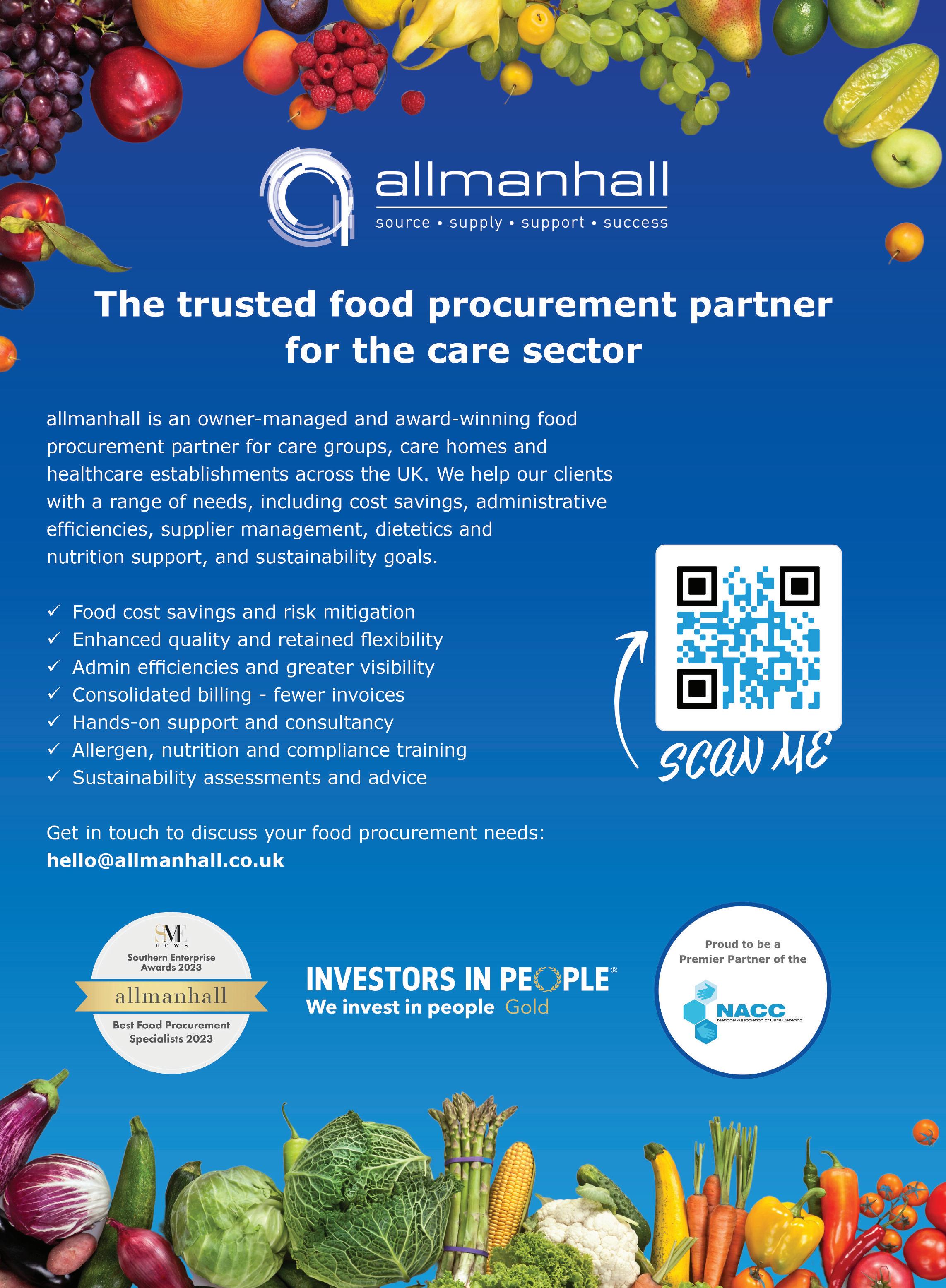
Food procurement specialists allmanhall, explore the importance of nutrition and hydration in older people specifically considered for a dignified and person-centric dining experience
Proper nutrition and hydration are critical in care homes directly impacting the health wellbeing and overall quality of life for residents Research by BAPEN reveals that malnutrition affects 35% of care home residents in the UK leading to a variety of health issues including increased infections, poor wound healing mental health decline social isolation and increased frailty This underlines the need for a comprehensive person-centric approach to food and drink in these environments
As people age the risks of malnutrition and dehydration increase compounded by the natural decline in thirst reflex and in some cases cognitive impairments such as dementia These factors make it challenging for older individuals to maintain adequate nutrition and hydration Therefore it s crucial that care home staff adopt a dignified approach to meals, recognising that the involvement in making choices about food remains important even when other capacities are diminished

At a recent National Association of Care Catering (NACC) Seminar care professionals emphasised the significance of creating a positive mealtime experience Engaging residents in conversations about their food preferences understanding their personal histories and ensuring that texture-modified meals are both nutritious and appealing are vital steps in enhancing mealtime satisfaction
Hydration is equally important playing a key role in bodily functions and the prevention of conditions like urinary tract infections and chronic renal disease Strategies to encourage fluid intake include offering a
variety of beverages, promoting "hydration hour" with mocktails, and providing high-fluid-content foods like soups and yogurts It s also important to educate care home staff on recognising signs of dehydration which can manifest as tiredness headaches and poor concentration
Nutritionally care homes should focus on nutrient-dense foods rather than calorie-dense ones Incorporating ingredients like eggs seeds, and Greek yogurt can help ensure that residents receive essential nutrients Additionally increasing dietary fibre through foods like whole grains, legumes, and unpeeled fruits can support digestive health and reduce the risk of conditions such as diabetes and heart disease It's important however to introduce fibre gradually to avoid digestive discomfort
For residents with dysphagia a condition that impairs swallowing care homes must offer texture-modified diets that are both safe and nutritious Providing adequate training for staff on preparing these meals, ensuring that they are nutritionally fortified, and enhancing flavours with herbs and spices can make these meals more enjoyable for residents
In conclusion providing a holistic person-centric dining experience in care homes is essential for maintaining the health and dignity of residents By focusing on nutrition hydration and individual preferences care homes can significantly enhance the quality of life for their residents
The mealtime experience is so much more than just food Care establishments across the UK are partnering with allmanhall to manage their food procurement achieve savings and improvements and to access support to enhance the overall dining experience Get in touch – hello@allmanhall co uk
no-melt formula resulting in shelf-stable ice cream products that can be enjoyed by everyone SCREAMIES ice-scream also never gets softer than IDDSI Level 4 making it the perfect treat for those with dysphagia

market
Launched in 2016 SCREAMIES is a brand with one purpose: to deliver the taste of sumptuous old-fashioned ice cream and make it accessible to everyone Each SCREAMIES product is created with a spe-
As well as the traditional three flavours Screamies offers Chocolate and Salted Caramel with added Protein for those with additional nutritional needs With a long shelf life Screamies can be stored at ambient temperature and frozen when the time suits Flavour Creations also offer a wide range of market leading supporting products for those looking to provide something extra to patients Pre-thickened Ready to Drink ranges include in excess of 20 flavour profiles Advital nutritionally complete powder comes flavoured and neutral and is used in snacks like Advital chocolate mousse and Fruits with Attitude Flavour Creations also supply high quality moulds and Shape It to assist with food preparation at all IDDSI levels
To find out more simply contact Albany Products at enquiries@albanyproducts co uk or call on 01706


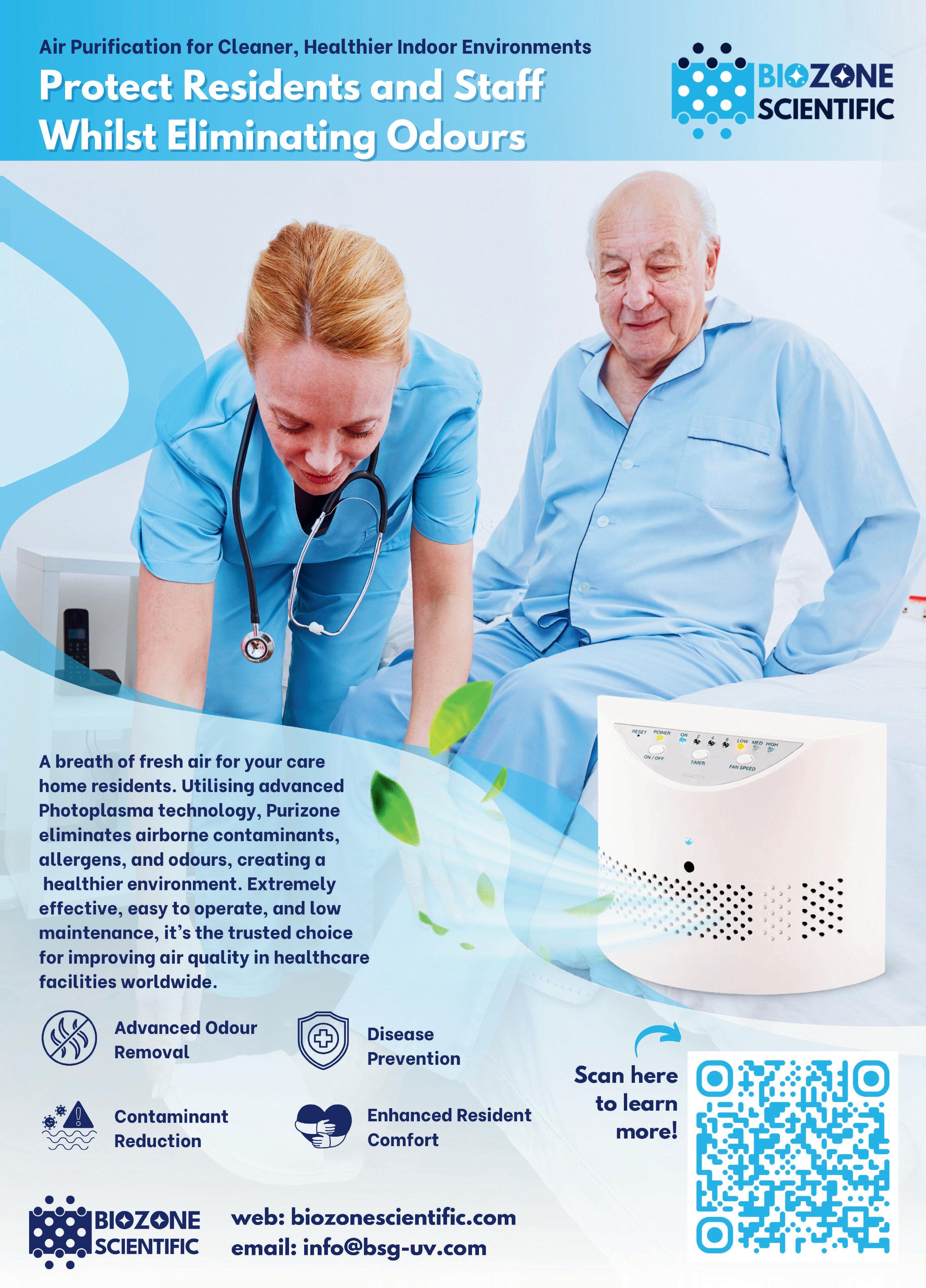



Oxy-Gen
This
Oxy-Gen
All
Carbon
With
See


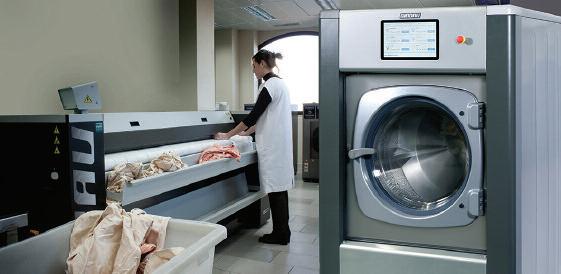


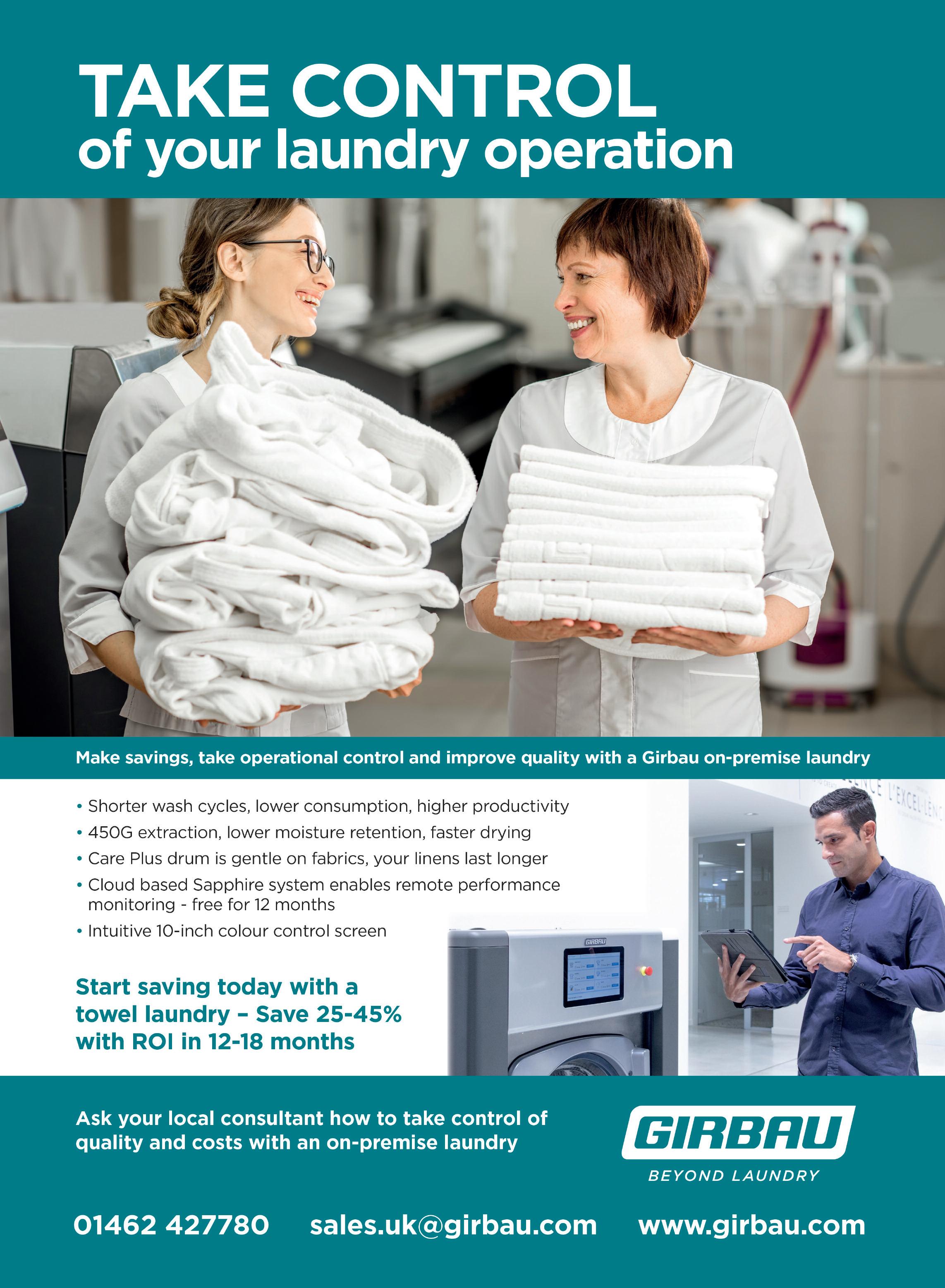
When




By Scott Williamson, Managing Director,

In the ever-changing and often demanding environment of residential and nursing care homes prioritising the well-being of residents is paramount As care providers it is imperative to explore innovative methods to enhance the quality of life for those in care especially individuals living with cognitive impairments such as dementia One highly impactful method embraced in recent years is sensory stimulation a comprehensive approach that enhances physical, emotional, and cognitive well-being With the integration of advanced AI technology, newer technologies such as personalised, relaxing music videos breathe new life into old black-and-white photos by colourising them accompanied by soothing music captivating landscape visuals and cherished family photos or video messages This provides a distinctive way to deliver a holistic, sensory-enriched experience that significantly benefits elderly residents and those with dementia
DIVERSE FORMS OF SENSORY EXPERIENCES
There are many ways to incorporate sensory experiences into daily care each offering unique benefits for residents
1 Visual Stimulation: Personalised relaxing music videos use serene natural landscapes and family memories to captivate residents' visual senses These familiar images, paired with scenic backdrops evoke positive emotions and comfort Advanced technologies such as AI-powered colourisation of old black-and-white photos bring memories of the past to life enriching the experience further by reconnecting residents with their personal history
2 Auditory Stimulation: The choice of music in these videos is key Rather than familiar music that may evoke specific emotions or memories soothing and non-intrusive sounds are purposefully chosen to enhance deep relaxation and open the senses to help immerse themselves in the visuals and relax without the distraction of nostalgia, allowing for a more profound sensory experience
3 Tactile Stimulation: Personalised videos can be paired with tactile activities to further engage residents Watching these calming visuals while interacting with textured objects fidget blankets or engaging in simple activities like handling soft fabrics can provide enhanced comfort and sensory richness
4 Olfactory Stimulation: While videos alone do not engage the sense of smell pairing them with aromatherapy sessions using calming scents like lavender or invigorating fragrances like citrus can amplify the relaxation experience making it more immersive and holistic
5 Gustatory Stimulation: Taste experiences can also complement sensory videos For example, while watching
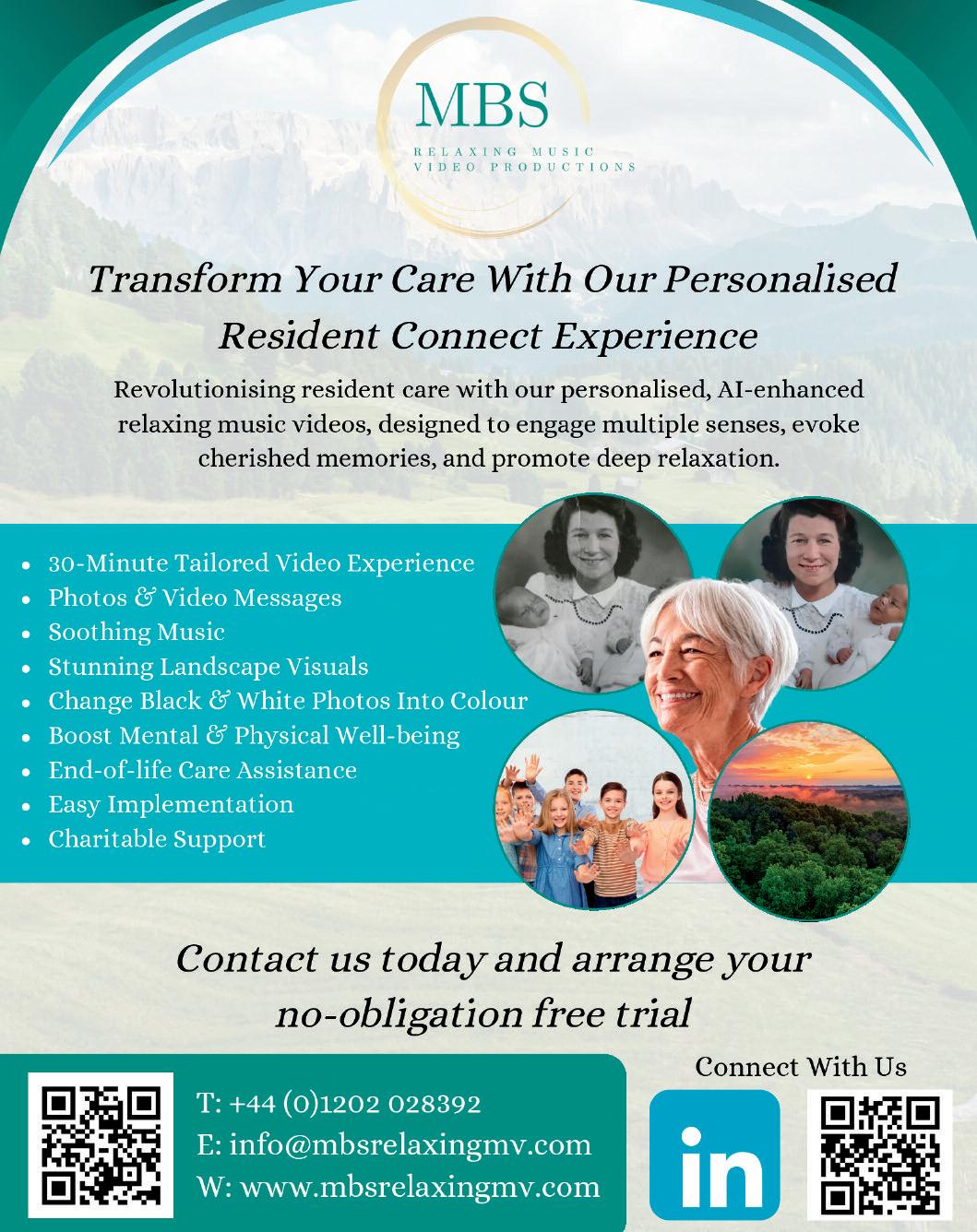
THE
personalised landscapes or family-themed videos, residents can engage in taste sessions, trying familiar and comforting flavours adding another dimension to the sensory experience
The implementation of sensory stimulation has wide-reaching benefits that can positively impact residents' emotional, psychological, and physical health Regular sensory activities offer the following advantages:
- Reduction in Agitation and Restlessness: Especially for residents with dementia, these videos create a sense of familiarity and calm reducing anxiety and behavioural issues
- Improved Cognitive Function: Engaging residents’ brains through visual and auditory stimuli helps maintain and in some cases improve cognitive abilities providing meaningful engagement
- Enhanced Communication: Residents who struggle with verbal communication often respond emotionally or cognitively to visual and auditory cues Personalised videos offer alternative ways for residents to express themselves facilitating greater interaction
- Increased Social Interaction: When shared in group settings, these videos encourage social engagement, helping reduce feelings of isolation and loneliness
SENSORY STIMULATION FOR DEMENTIA PATIENTS
For dementia patients sensory stimulation plays a particularly important role in their care Personalised videos offer structure, evoke memories, and facilitate moments of connection between residents and caregivers or family members Combining these videos with other sensory activities such as memory boxes filled with personal items can deepen the experience, triggering memories and meaningful conversation
CREATING SENSORY ROOMS IN CARE HOMES
Many care homes have found success in creating dedicated sensory rooms Personalised relaxing music videos are ideal for use in these spaces where they can be combined with soft lighting calming scents and tactile objects to offer a fully immersive environment These sensory rooms provide a tranquil retreat for residents allowing them to engage multiple senses in a way that is soothing and beneficial
THE POWER OF VISUAL LANDSCAPES FOR SENSORY STIMULATION
Visual landscapes such as nature scenes are an invaluable tool for sensory stimulation For residents who may no longer be able to experience the outdoors firsthand, these videos offer a powerful connection to the natural world Scenes of oceans forests or mountain views have been shown to reduce anxiety alleviate stress and promote mental well-being The immersive quality of these visuals when combined with soothing music provides a window to the outside world offering comfort and emotional enrichment for residents who may feel disconnected from nature
AI TRANSFORMING RESIDENT CARE
The integration of AI into sensory stimulation is revolutionising how care homes approach resident wellbeing AI technologies such as the colourisation of old photographs help residents reconnect with their past in vivid detail These enhanced visuals combined with calming music and personal video messages from loved ones create a multi-sensory experience that reduces anxiety and promotes emotional well-being This innovative use of AI not only improves the sensory experience but also strengthens cognitive function making it an essential tool in modern care homes
THE VALUE OF PHOTOS AND VIDEO MESSAGES FROM LOVED ONES
Incorporating photos and video messages from loved ones adds an emotional layer to sensory stimulation Seeing familiar faces and hearing the voices of family members triggers emotional recognition which can provide comfort and reduce anxiety especially for those experiencing memory loss This personalised approach creates meaningful connections stimulating both visual and auditory pathways and offering moments of joy and clarity for residents
Moreover video messages combat feelings of loneliness and isolation Residents feel a stronger sense of belonging and connection to their loved ones, even if they cannot be physically present This can significantly enhance their overall well-being contributing to a more enriching care environment
SENSORY
Sensory therapy particularly 30-minute video experiences serves as a versatile tool for structured activities With the ability to loop the videos for longer experiences caregivers can find moments of respite while enhancing the well-being of residents Creating a calm and engaged environment through sensory videos can improve the caregiving experience and reduce caregiver burnout
CONCLUSION
The integration of sensory stimulation, particularly through personalised AI-enhanced relaxing music videos offers a transformative approach to improving the well-being of residents in care homes By engaging multiple senses including visual, auditory, tactile, olfactory, and even gustatory, these videos provide a holistic and enriching experience that benefits both residents and caregivers For individuals living with cognitive impairments like dementia these sensory experiences evoke memories reduce anxiety and foster emotional connections
The use of advanced AI technologies such as the colourisation of old photos combined with serene landscapes, soothing music, and messages from loved ones, adds a deeply personal and meaningful dimension to the care environment The implementation of sensory rooms and dedicated sensory activities not only enhances residents' physical and emotional health but also offers caregivers a valuable tool for creating a calm structured environment As care homes continue to evolve embracing sensory therapies will remain essential in promoting a higher quality of life for elderly residents and those living with dementia



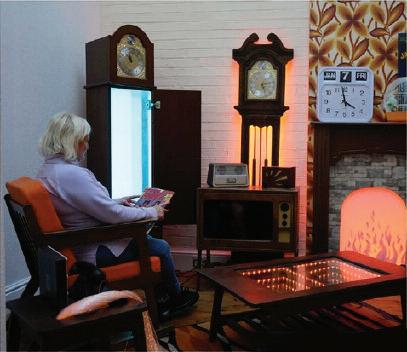

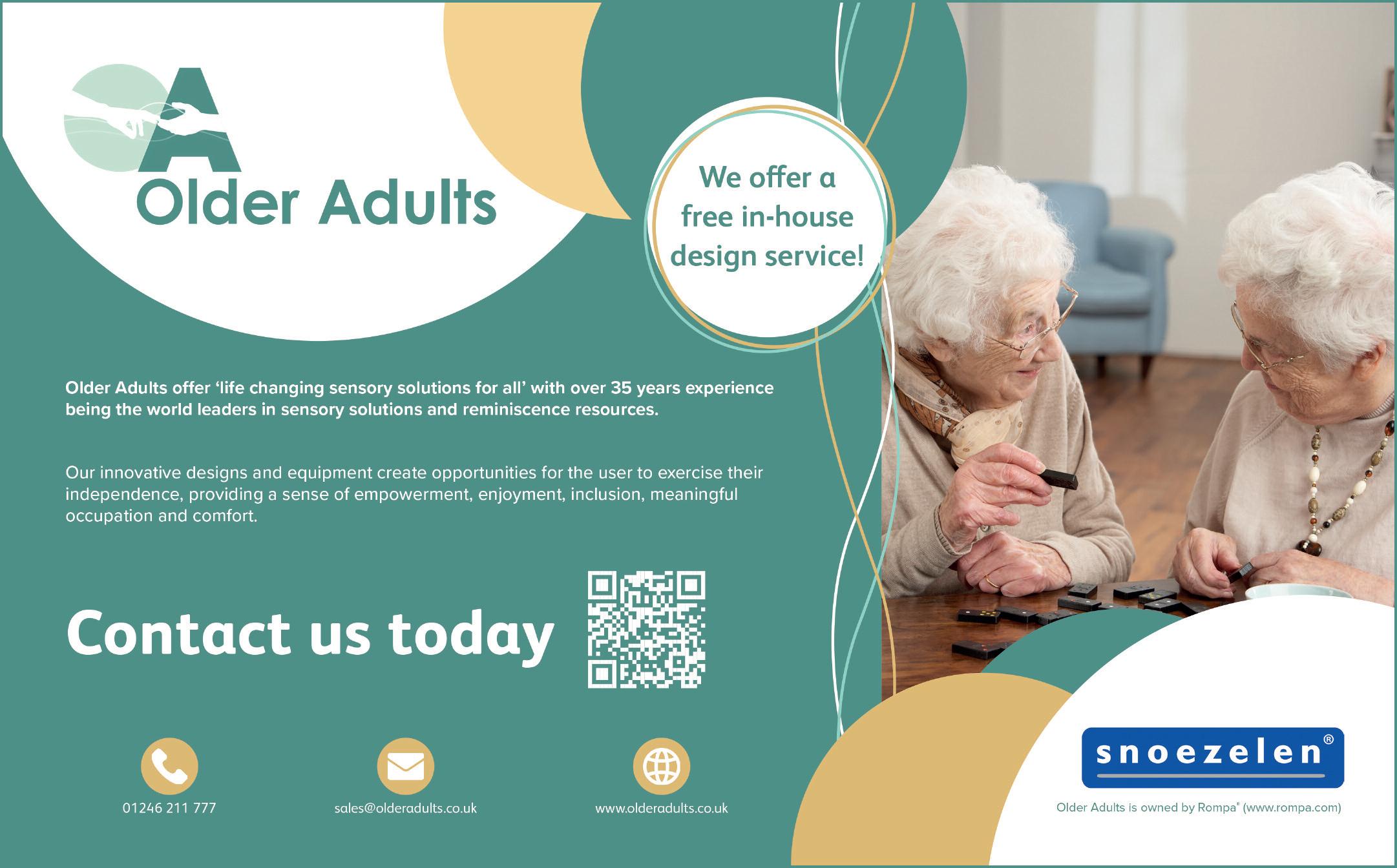

Increase
Improve
Deliver

PASS
Visibility of allergies vaccinations and medications especially useful for clients unable to reliably share their personal information
• Using medical information to inform care planning
Ensuring that the right medication is delivered to the right person in the timeliest manner In one case this allowed the administration of antibiotics on a Friday evening aiding the service user’s swift recovery from infection
Available to all PASS users at no additional cost PASS GP Connect is significantly more efficient than waiting for a GP response It’s also a positive step forward on the path to the DHSC s goal for widespread digitally enabled care and is in full alignment with their ambition for joined up care for everyone
Get in touch: www everylifetechnologies com hello@everylifetechnologies com
The job of a care worker though immensely rewarding is not without its challenges A growing demand for social care has seen carers placed under greater strain, with a mounting workload and limited resources
Increasingly, carers are also exposed to abusive and even violent behaviour from service users and their relatives Be it deliberate or as often the case unintentional Such aggression can leave a profound mark on diligent and dedicated care staff

The solution to many a modern-day problem is often tech and so too is this the case when dealing with today s care landscape STAFF ALARM SYSTEMS
Tech has proven to be a friend to the care worker automating administrative tasks, enhancing reporting and, in the case of staff alarm systems protecting them from potential harm What was originally a bell to alert colleagues to the need for assistance has become far more sophisticated The modern safety alarm is discreet can be easily attached – if not part of – the wearer’s uniform It is supremely efficient and designed with the accuracy to pinpoint the exact location of an active call in a ward of over 80 rooms
the press of a button is incredibly empowering Be it calling lunchtime cover on a 1-to-1 patient, or requesting urgent assistance with an abusive resident the alarm offers staff a greater deal of control assurance and resources while at work HOW DOES IT WORK?
With the press of a button carers have immediate access to a team of responders able to assist, provide cover, and - where neededintervene to de-escalate high-risk situations This access instils confidence in staff: confidence that the highest quality of care can be delivered and confidence in their safety in the workplace For overwhelmed care workers the ability to summon help with
In Pinpoint s case an integrated staff safety system ensures full site security When activated a personal staff alarm emits infrared signals to receiver units installed throughout the building These, in turn, send vital information to display units and devices such as pagers and desktops detailing the exact location and type of call – assistance or emergency
Within 85 milliseconds of triggering an alarm colleagues are informed that an incident is taking place and, crucially, exactly where it is in the building (CONTINUED OVERLEAF)
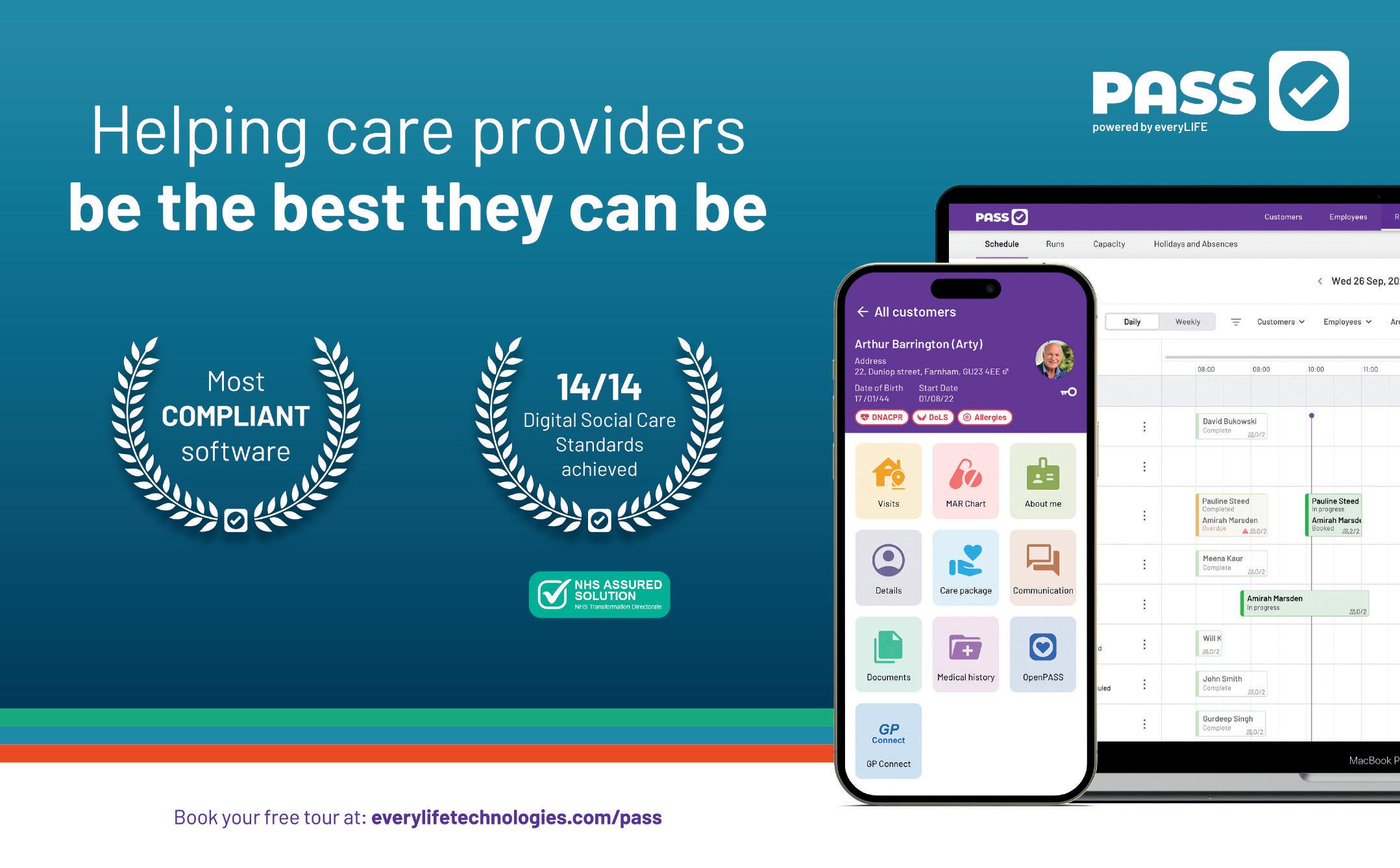
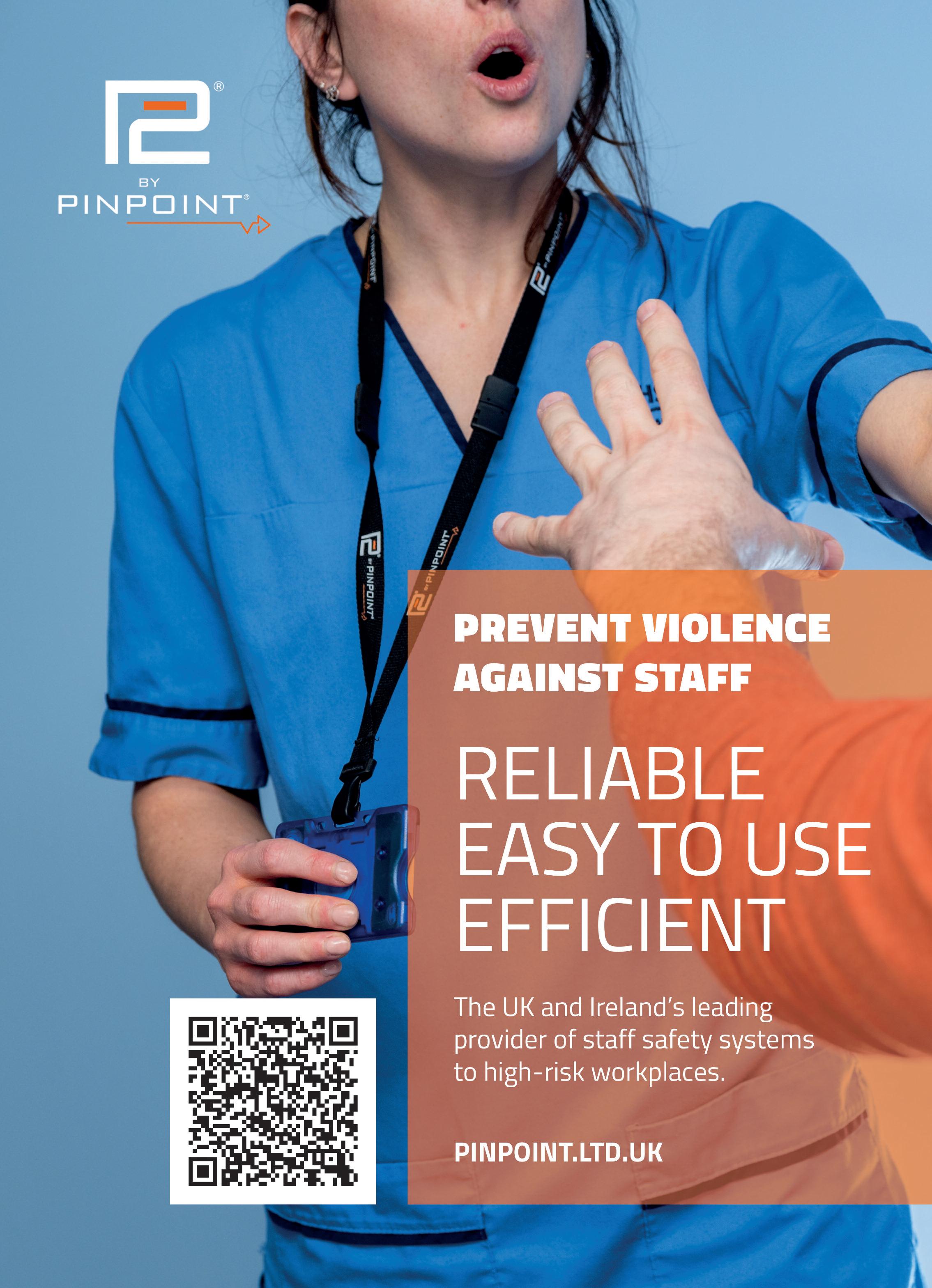




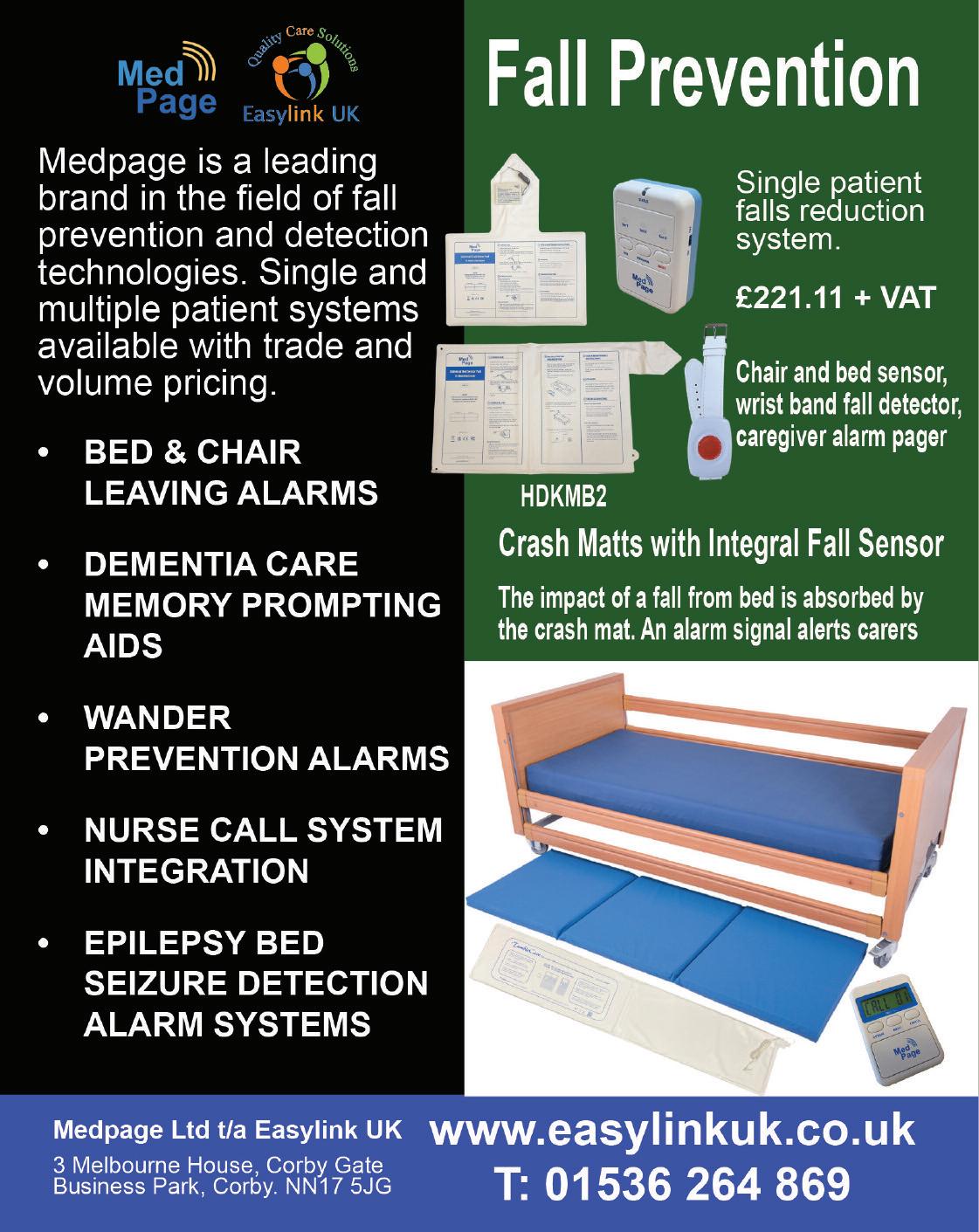
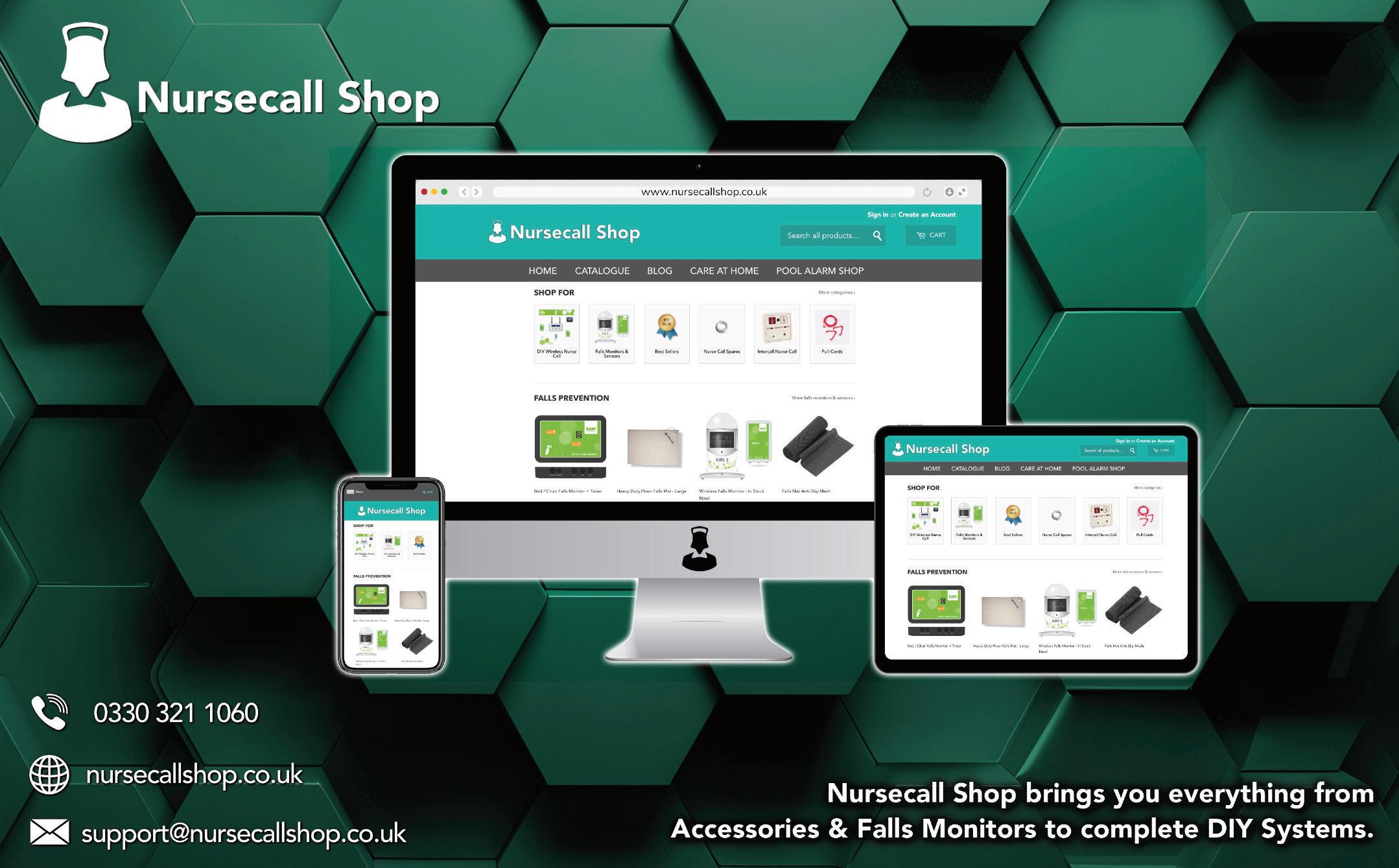
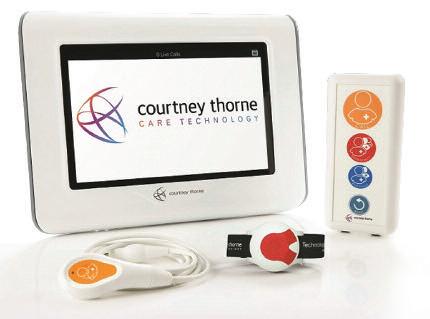


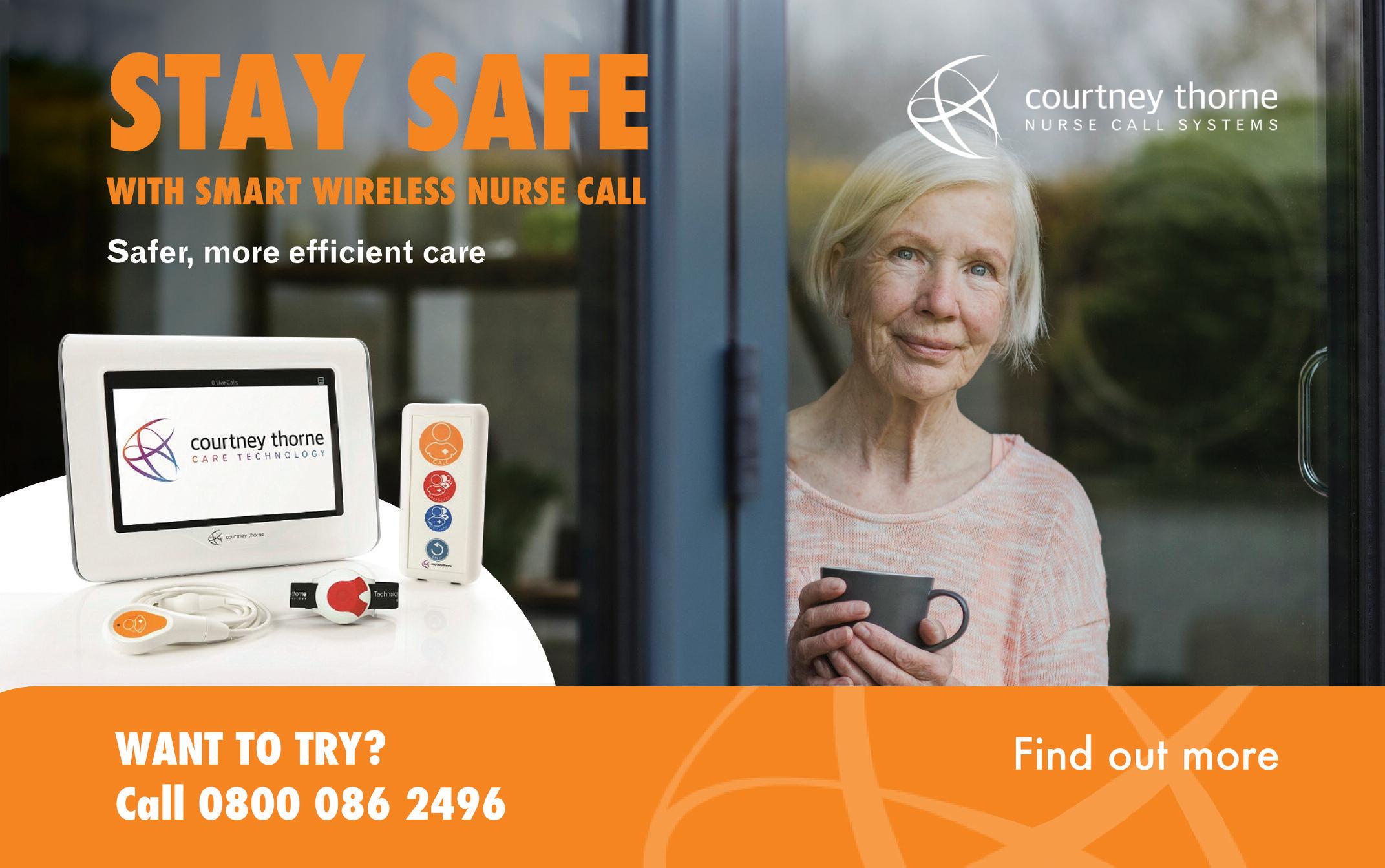
Explore the Char ted Manager Degree Apprenticeship (CMDA) with Mar y Seacole at the University of Exeter
Have you ever wondered about advancing your career, but unsure how to gain the qualifications required whist working? There is an ever-increasing demand for skilled managers within the care sector, and having practical experience is just not enough to fill those positions
Gaining a BSc (Hons) in Responsible Business Manager and




Work can and should always be a force for good But one in four workers (25%) in the north of England have experienced conflict at work over the past year, with most choosing not to report incidents such as verbal abuse and harassment according to the 2024 CIPD Good Work Index: North of England report
The research – from the annual survey of close to 900 workers across Yorkshire and Humber the North East and North West - also reveals that victims of workplace conflict suffer more from poor mental health and a lack of trust and confidence in management
As a trusted advisor to the government, the CIPD - the professional body for HR and people development - is calling for employers to ensure line managers are trained and prepared to deal with conflict effectively This starts with addressing the underlying causes such as poor management practices and excessive workloads
WHAT CONSTITUTES AS BULLYING, DISCRIMINATION, AND HARASSMENT?
The world of work is changing at pace and line managers are facing many new people challenges For some employees, homeworking and the rise of technology threatens to create an ‘always-on’ culture where issues can be spread far and wide, across online chat platforms Therefore it’s never been more important for line managers to play a vital role in identifying challenging and dealing with conflict at work
including unfair treatment and sexual harassment
To achieve this they need to participate in regular people management training This should offer specifics around what bullying discrimination and harassment looks like and how to resolve conflict by being able to have difficult yet open and honest conversations to prevent and tackle conflict at work
Managers must also take the time to understand their organisation’s policies and procedures on bullying, discrimination, and harassment and how to report issues in a timely manner, so they are investigated swiftly
IS A MANAGER’S ‘STYLE’ CAUSING CONFLICT AND STRESS?
Managers are at the heart of people s experience of their workplace What they do and say has a significant impact on their team s motivation engagement and overall performance This explains why management style can often be the source of conflict and is the second most common cause of stress at work after unmanageable workload
People managers must reflect on their own management style and the impact their behaviour has on others They should become part of the solution to resolving workplace conflict at an early informal stage before incidents escalate
To do this people managers must be open collaborative and compassionate to create a culture where staff feel trusted and confident to speak up without fear of judgement or being ignored
AVOIDING EXCESSIVE WORKLOADS & AN ‘ALWAYS ON CULTURE’
Rising technology and remote working is giving many employees –particularly parents and carers – a better work-life balance However, the blurred lines between work and home have led to many staff working longer hours to manage increasing workloads – often out of hoursand working when they are ill
Line managers need to take effective steps to manage the main risks of excessive workloads which can cause stress and mental ill health among their workers




the successful franchisee to deliver SecuriCare training programmes in their designated territory
By Daphne Doody-Green, UK Market Director, CIPD
As part of this they must assess individual and team workloads to make sure they are reasonable set clear expectations about taking breaks and act as role models for healthy working practices This includes taking time off themselves when sick Providing staff with autonomy to control how, where and when they work is also key to empower rather than restrict them in their roles
MONITORING AND REVIEWING WORKPLACE CONFLICT
Staff attitude surveys will enable people managers and the wider organisation to collect feedback in areas like gender equality and bullying and harassment
Monitoring the gender diversity of the workforce at every level, including for recruitment and promotion will also help to highlight if there is any potential discrimination or harassment on grounds of gender
NEW LAW TO PROTECT WORKERS FROM SEXUAL HARASSMENT
From October 2024 the Worker Protection (Amendment of Equality Act 2010) Bill will strengthen existing protection for workers against sexual harassment
The new law will place a new duty on employers to take reasonable steps to prevent sexual harassment Tribunals will have the power to increase compensation by up to 25% if they find an employer has breached this duty
Therefore it is essential that people managers are proactive and systematic in how they tackle and prevent sexual harassment at work by providing evidence of the reasonable steps taken This includes undertaking regular training and development to understand their role in preventing and addressing sexual harassment
FREE RESOURCES FOR LINE MANAGERS
The CIPD offer a range of free resources for people managers to develop their management capabilities and prevent and tackle workplace conflict including bullying and harassment



But
By Daniel O ’Shaughnessy, Programme Manager - Better Security, Better Care, Digital Care Hub

Check
Strengthen
continuity plan: Ensure it covers how you will manage if you were to lose access to data for a period of time Watch out for our new cyber incident response checklist – coming in October for Cyber Security Awareness Month
Create back-ups Identify what data is essential to running your service, and create a backup separate from


Founded

quality

Mike Whitehead CEO of Danforth Care commented: “Since day one our mission has always been to create a home-like atmosphere for our residents that is safe, secure, and encourages independence We are committed to providing the highest quality of care and services to our elderly residents and we strive to create a place where they can be comfortable while feeling respected and valued The support from Warwick and the financial backing they received from OakNorth will help accelerate our growth highlighted by our expectation to open seven further homes in the coming months ”
Deepesh Thakrar, Senior Director of Debt Finance at OakNorth added: “We were delighted to support Warwick on this project as it emphasises our strong ambitions to do more to
seen them

Email:
